May 2015
May 2015 Estelle Greeff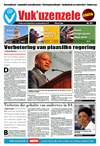
Translations:
Improving local government
Improving local government Estelle GreeffAfter 15 years of local government, South African communities are experiencing better access to services such as water, sanitation and electricity.
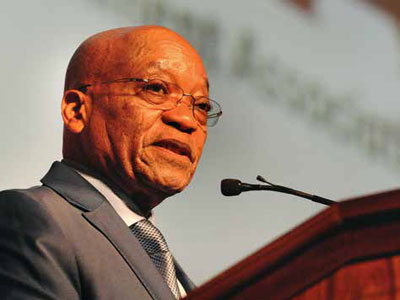 Housing developments have created vibrant communities that have facilities such as crèches, clinics and schools.
Housing developments have created vibrant communities that have facilities such as crèches, clinics and schools.
Government has also replaced almost 500 informal settlements with quality housing and basic services over the past five years.
“We have made significant progress since the dawn of democracy to respond to the injunction that there shall be houses, security and comfort, cited in the Freedom Charter,” said President Jacob Zuma. He was speaking at the South African Local Government Association (SALGA) National Members Assembly (NMA) held in Midrand recently.
The NMA is a meeting for local government leaders to reflect on progress made in local government and also to find ways to strengthen local government and improve services.
The theme for this year’s conference was “Celebrating 15 years of Democratic Local government and also to find ways to strengthen local government and improve services.
The theme for this year’s conference was “Celebrating 15 years of Democratic Local Government. Going back-to-basics to consolidate and deepen a developmental and people centred local democracy.”
The President said many communities were already experiencing progress by receiving basic services. “The release of the 2011 Census confirmed the great strides made in providing basic services.
This upward trend is reinforced by the last report on the non-financial census of municipalities which was released on 2 September 2014,” he said.
According to the report, services provided by municipalities have reduced poverty.
The report shows that 5.3 million households are receiving free basic services and that of the 11.8 million who receive basic water services, 2.5 million of them benefit from indigent support. Indigent households are those that qualify for rebates or service subsidies.
Ten million consumer units are receiving sewerage and sanitation from municipalities in South Africa and 31.1 per cent of these con¬sumer units have access to free basic sewerage and sanitation.
“While the lives of millions have improved meaningfully, there are many others who are still waiting, who still need to see their lives changing for the better.
They want water, electricity, housing, roads and decent schools near their homes,” emphasised President Zuma.
South Africa's good story
The President told delegates that a lot of good had happened in South Africa during the past 20 Years of Freedom and that the country did have a good story to tell.
“This is a story of a caring, effective government that has worked wisely and diligently with scarce resources to make deep, positive changes in people’s lives.
“This is a story of good work and centres of excellence that have emerged across the length and breadth of our country, in provinces and in the local sphere.”
The President encouraged local governments to work together and share lessons learnt.
“There are municipalities that are functioning effectively, with effective political and administrative systems, with strong internal audit and financial management structures,” said President Zuma.
He said these municipalities had clean administration where the staff prioritised fraud prevention and risk management.
These municipalities, said the President, also have a zero tolerance to poor performance, and conduct regular performance reviews and implement corrective measures where needed.
“This is what all municipalities should do, because local government exists to serve the people. That is the bottom line.”
He congratulated all municipalities that have made a difference in changing peoples’ lives.
“Your work is acknowledged and appreciated,” he said. The President called on delegates to do better and work harder to make South Africa a better place for all.
“We should do better in improving services such as water infrastructure, solid waste management or the provision of electricity.
“These are simple basic services that, when provided efficiently, will make our people’s experience of local government a pleasant one.”
Professionalising local government
For local government to solve some of the challenges it faces it needs to be managed by professional and qualified people.
According to President Zuma, government has responded to improve professionalism and the management of local government by introducing amendments to local government legislation such as the Municipal System Amendment Act.
“There should be no compromise in ensuring that officials possess the necessary minimum skills,” he said.
The President said chief financial officers, engineers and other technical staff should be skilled and be experts in their line of work.
SALGA has made efforts in improving leadership and ensuring that there are proper skills in local government by introducing tailor-made induction programmes to help councillors understand their roles and responsibilities better.
According to the Chairperson of SALGA, Thabo Manyoni, the organisation has successfully piloted an Executive Leadership Development Programme.
Going Back-to-Basics
At the Presidential Local Government Summit, also held in Midrand, in September 2014, local government officials jointly agreed to go back to the basics to provide quality services to communities.
The Back-to-Basics programme aims to build responsive, caring and accountable municipalities.
“We committed to ensuring that municipalities are able to provide water, electricity, parks, street lighting, refuse removals, repairing of potholes, dealing with the frustrating interruption of services and billing problems affecting households,” he reminded delegates.
He said municipalities must also communicate clearly and give feedback to communities they serve.
“Going back to the basics means reviewing tendering systems and dealing with corruption systematically within the supply chain system in local government.”
The President highlighted that municipalities must work harder to increase poverty-alleviation programmes such as the Community Work Programme, which provides skills and work opportunities.
“Back-to-basics also enjoins municipalities to boost rural development by supporting small enterprises, cooperatives and smallholder farmers in rural towns and villages.”
He urged delegates to rededicate themselves to serving diligently in all three spheres of government.
“We should always remember that effective public administration is not a privilege in a democratic society. It is a fundamental right.”
He emphasised that all three spheres of government should strive to meet the public’s expectations of services in a timely manner close to where they live.
“They must be delivered efficiently and effectively through appropriately trained public servants.”
SERVICE DELIVERY IN NUMBERS: |
|
|
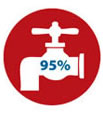 |
|
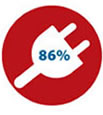 |
|
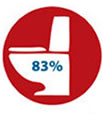 |
|
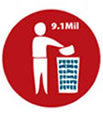 |
|
 |
|
 |
Enhancing the quality of education in SA
Enhancing the quality of education in SA Estelle GreeffThe national Department of Basic Education (DBE) is working hard to improve the quality of education across the country, particularly when it comes to maths, science and technology.
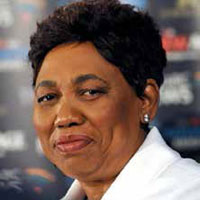 At the third Mathematics, Science and Technology (MST) Roundtable recently, Minister of Basic Education Angie Motshekga said although a lot still needs to be done to improve learner participation and the success rate in the MST space, there’s no doubt that considerable progress has been made.
At the third Mathematics, Science and Technology (MST) Roundtable recently, Minister of Basic Education Angie Motshekga said although a lot still needs to be done to improve learner participation and the success rate in the MST space, there’s no doubt that considerable progress has been made.
The department has already established a fully functional and dedicated MST Directorate, which is driving a MST improvement plan that has already undergone a thorough review process.
“Plans are afoot to collapse the Dinaledi and technical schools’ conditional grants into a new and combined system-wide grant - the MST Conditional Grant - and discussions with Treasury are at an advanced stage,” she said.
Dinaledi is a DBE initiative with a particular focus on maths and science. In addition, the DBE has commissioned a MST Big Fast Results Lab to develop a longterm strategy to improve teachers’ content knowledge on these subjects. “The MST Lab will develop mechanisms to encourage greater learner participation and will finalise a sector plan needed for a systematic and increased success rate,” Minister Motshekga said.
Getting a handle on the challenges
The Minister and Deputy Minister Enver Surty raised a number of challenges around MST during The New Age Business Briefing recently. These included providing resources, teachers’ capacity, monitoring and support.
These challenges were identified by a Ministerial Task Team looking into MST.
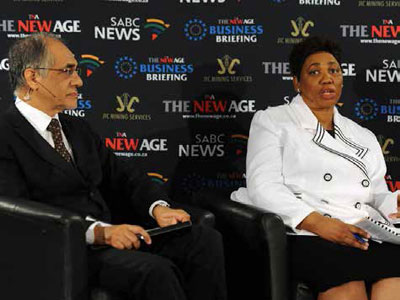 The team also found that provinces do not have adequate plans in place for external support or partnerships with the private sector or non-governmental organisations (NGOs). “This often results in an avalanche of NGOs in schools, but their involvement is not coordinated. Very often, they identify schools without proper involvement and knowledge of the department and speak directly to benefiting school principals,” said Minister Motshekga.
The team also found that provinces do not have adequate plans in place for external support or partnerships with the private sector or non-governmental organisations (NGOs). “This often results in an avalanche of NGOs in schools, but their involvement is not coordinated. Very often, they identify schools without proper involvement and knowledge of the department and speak directly to benefiting school principals,” said Minister Motshekga.
“That’s why the Council of Education Ministers put a directive in place, in August 2014, to ensure better coordination of partnerships for optimal benefit. The National Education Collaboration Trust (NECT) will play a central role in coordinating these partnerships,” she said.
Organisations such as TeachSA will also have an important role to play to develop a plan for teacher supply, use and development to enhance learner output, participation and performance in MST.
The MST Roundtable also aims to create a platform for information sharing and to strengthen cooperation and partnerships with NGOs.
The third MST Roundtable resolved to:
- Strengthen the National MST Strategy Plan.
- Improve the participation and success rate in MST.
- Provide a framework for public-private partnerships to channel resources to schools in conjunction with NECT.
- Provide a comprehensive plan for teacher supply, use and development of MST programmes in partnership with TeachSA.
- Identify different platforms to utilise information communication technology (ICT) to boost participation and the success rate of schools.
Using ICT to benefit schools
Information communication technology (ICT) is also a strong departmental focus area, especially in rural schools, which make up 25 per cent of all schools across the country.
The DBE is in the process of closing some of the smaller, non-viable rural schools; supporting those that are viable and introducing ICT to those where multi-grading can’t be avoided.
“It’s a multi-pronged strategy,” Minister Motshekga said.
Deputy Minister Surty said the department is working with its provincial departments to ensure that the education districts are data-driven.
“We know how each learner is performing in terms of literacy and numeracy, and we can measure performance.
We have captured more than 10.8 million learners on the system and the intention is to have a universal database of every single learner in the country by the end of the year. This will help the districts to make appropriate decisions, informed by evidence.”
Previously, in the Eastern Cape, less than 18 per cent of schools had connectivity in terms of ICT and were unable to use the South African Schools Management System.
“Today, more than 92 per cent of these schools are connected and data is easily available,” Deputy Minister Surty said.
A number of Education MECs were also at The New Age Business Briefing. Gauteng Education MEC Panyaza Lesufi appealed to parents to be the “pillars of our schools and participate in school governing bodies”.
“It’s your choice. It’s your call. Make yourself available,” he said.
Mpumalanga Education MEC Reginah Mhaule spoke about how the province is working with its districts to ensure quality education in the province.
“We are closing farm schools, those that are not sustainable and multi-grade schools, but not all of them as we need to achieve this over a number of years. We have built five boarding schools, four of which are already open and have closed more than 20 schools so far.”
Despite the determination of Minister Motshekga and her MECs to improve the quality of South Africa’s schools, they agree that education is a societal issue.
“Parents have an indispensable role of supporting education for the benefit of all the country’s children.”
Innovative solutions for an effective local government
Innovative solutions for an effective local government Estelle GreeffCooperative Governance and Traditional Affairs Minister Pravin Gordhan urged delegates attending a South African Local Government Association (SALGA) National Members Assembly (NMA) to do more with less.
In his speech at the NMA held in Midrand recently, the Minister said: “We have financial limitations in South Africa. The question is how do you do more with less and for the next few years, that’s all you’re going to hear.”
South Africa, as with the rest of the world, is facing tough economic challenges. This means that government as a whole and local government in particular, will have to come up with innovative solutions to provide services to communities.
In an effort to encourage municipalities to think out of the box, a few municipal representatives shared their innovative solutions with their counterparts at the SALGA NMA.
“Innovation is critical in dealing with challenges in local government. We are an innovative nation with some of the most innovative ideas coming from the most rural parts of our country,” said Centre for Public Service Innovation (CPSI) in South Africa CEO, Thuli Radebe.
She said every year the country witnessed this innovation through the CPSI Awards, with the largest number of winners coming from local government.
Innovation brings services closer to the people
A number of municipalities across the country use innovation to provide services to their communities. One such municipality is the eThekwini Municipality’s Water and Sanitation (EWS) unit.
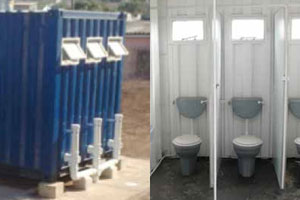 The EWS unit manages the water and sanitation within the eThekwini Municipality and has worked with, among others, the Bill and Melinda Gates Foundation, and the World Bank.
The EWS unit manages the water and sanitation within the eThekwini Municipality and has worked with, among others, the Bill and Melinda Gates Foundation, and the World Bank.
In 2014, the unit won the 2014 Stockholm Industry Water Award for the “Most innovative and progressive water utility in Africa”. EWS unit representative, Dave Wilson, outlined the use of modified shipping containers as community ablution blocks to solve the sanitation challenge in informal settlements.
The makeshift ablution containers benefit approximately 600 informal settlements.
“These settlements have been identified for future formal housing development by the municipality,” said Wilson.
To date 1 100 ablution facilities have been installed on 600 sites throughout eThekwini, and one facility serves about 50 shacks within a 200-metre radius.
“The municipality appoints caretakers and community liaison officers to maintain the facilities, and the toilet paper and soap are supplied by the unit,” said Wilson.
Apart from creating jobs and stimulating small business development, this project also protects the health of the local communities.
The City of Tshwane is another municipality that is using innovation to improve people’s lives through its digital-technology initiative called Project Isizwe.
Project Isizwe has rolled out some 600 Wi- Fi sites to date, offering coverage to over two million people. According to the municipality, an estimated three million people will have access to free Wi-Fi by the end of 2015.
“Internet connectivity must be treated as a basic delivery of service. Populations are becoming younger, which means government needs to keep up and move with the times, particularly when it comes to young people,” said the Executive Mayor of Tshwane, Kgosientso Ramokgopa.
In November last year, the City also launched Tshwane Wi-FiTV, which hit the one million view mark in early February this year.
Tshwane Wi-FiTV covers topics such as music, current affairs, entrepreneurship, religion, jobs and sport.
“The Wi-Fi filmmakers for this content were previously unemployed or under-employed,” said Ramokgopa.
Another innovative platform launched by the City is the DigiMbizo, a digital version of izimbizo that national government holds across the country to communicate face-toface with communities.
“DigiMbizo allows Tshwane communities to have an Imbizo with the mayor in the comfort of their own homes,” said Ramokgopa.
Community members are able to use Twitter to tweet their questions or concerns with the Mayor using the hashtag #DigiMbizo or #AskRamokgopa and get an immediate response.
Through the DigiMbizo, the municipality is able to reach social groups that normally do not attend traditional forums, explained Ramokgopa.
“It also helps us to monitor public sentiment and enhances the speed of resolving issues.”
Unite against attacks on foreign nationals
Unite against attacks on foreign nationals Estelle Greeff
Fellow South Africans, recently we have witnessed shocking and unacceptable incidents of violence directed at foreign nationals in some parts of KwaZulu-Natal, which has now spread to some parts of Gauteng. Similar incidents had taken place in Soweto in January.
No amount of frustration or anger can ever justify the attacks on foreign nationals and the looting of their shops.
We condemn the violence in the strongest possible terms. The attacks violate all the values that South Africa embodies, especially the respect for human life, human rights, human dignity and Ubuntu.
Our country stands firmly against all intolerances such as racism, xenophobia, homophobia and sexism.
We extend our condolences to the families of all who have lost their lives and wish the injured a speedy recovery.
We appeal for calm, an end to the violence and restraint. Criminal elements should not be allowed to take advantage of the concerns of citizens to sow mayhem and destruction.
Dialogue
Any problems or issues of concern to South African citizens must be resolved peacefully and through dialogue.
The police have been directed to work round the clock to protect both foreign nationals and citizens and to arrest looters and those committing acts of violence.
We urge communities to assist the police by providing information on the incidents that have taken place in Gauteng and KwaZulu-Natal so that the perpetrators can be brought to justice.
We thank religious leaders, non-governmental organisations and other stakeholders who are providing humanitarian assistance to the displaced people.
While we strongly condemn the attacks, we are aware of, and are sympathetic to some of the issues that have been raised by affected South African citizens.
We reiterate our view that South Africans are generally not xenophobic. If they were, we would not have such a high number of foreign nationals who have been successfully integrated into communities all over our country, in towns, cities and villages.
There are socio-economic issues that have been raised which are being attended to.
These include complaints about illegal and undocumented immigrants in the country, the increase in the number of shops or small businesses that have been taken over by foreign nationals and also perceptions that foreign nationals commit or perpetrate crime.
We wish to emphasise that while some foreign nationals have been arrested for various crimes, it is misleading and wrong to label or regard all foreign nationals as being involved in crime in the country.
In addition, not all foreign nationals who reside in our country are here illegally.
Many are in the country legally and contribute to the economy and social development of the country. Many bring skills that are scarce that help us to develop the economy and are most welcome to live our country.
Others came to South Africa as refugees having run away from conflict or wars in their countries of origin, in the same way that many South Africans left this country at some point and lived in other countries in the continent and beyond.
We were treated with generosity, dignity and respect by our brothers and sisters from the rest of the continent. We will never forget that hospitality and solidarity.
The support of the Frontline states in Southern Africa and that of the Organisation for African Unity was critical to the achievement of the freedom and democracy we are enjoying today.
We all have a responsibility to promote social cohesion, peaceful co-existence and good relations in the country.
Responsibilities
In this regard, government will continue to play its role and fulfil our responsibilities and obligations as members of the African Union and the United Nations.
Refugees and asylum seekers will be accorded support in line with international law and protocols, with the support of the United Nations High Commissioner for Refugees.
We appeal to our people to support and protect refugees and asylum seekers.
I have deployed the Ministers of Police, State Security and Home Affairs to work with the KwaZulu-Natal Provincial government to quell the violence and bring the situation to normality. They have done well but the problem requires a much more comprehensive and sustainable long-term intervention.
I have therefore assigned the entire Justice Crime Prevention and Security Cluster to work on this issue intensively, joined by the Ministers of Social Development, Trade and Industry and Small Business Development.
The security cluster and economic departments had already begun working on this matter, following the Soweto incidents in January.
Communities
I have now directed them to work faster and to engage affected communities, organisations representing foreign nationals, business, non-governmental organisations and other stakeholders to attend to the concerns raised on both sides.
The objective is to avoid future incidents by improving relations and promoting peaceful co-existence between citizens and our brothers and sisters within the continent, as well as other foreign nationals. We will also be seeking cooperation and support from the affected foreign missions based in South Africa. The Minister of Home Affairs met with African Heads of Missions recently.
The Minister of International Relations and Cooperation took these discussions forward as well in her engagements with the African Heads of Missions as well on 17 April.
We request Members of Parliament to work with us as well, in their constituencies, to improve relations and promote peaceful coexistence between our people and foreign nationals.
Measures are also being put in place to improve controls and better regulate immigration into our country.
In this regard, government is making progress with establishing the Border Management Agency, which will manage the border environment and all ports of entry.
The capacity of the Department of Home Affairs is being improved to enable it to better handle migration issues especially at border posts.
In this regard, the SANDF will transfer 350 soldiers to Home Affairs, to work as immigration officers at border posts.
Furthermore, the SANDF has deployed military personnel along the border line in seven provinces to prevent border crime activities and illegal border crossings.
Fellow South Africans, we urge all of you to exercise calm and restraint.
We also urge those who use social media, to refrain from fanning the flames of violence on Facebook, twitter and other platforms.
We all have a responsibility to promote social cohesion, peaceful co-existence and good relations in the country.
Foreign nationals help us to develop a cosmopolitan atmosphere and we welcome their presence. We also want to see an increase in tourism figures from countries in the continent and to share a lot of business opportunities as part of promoting sustainable economic development in the continent.
African identity
Africa Month celebrations provide an opportunity for us to further promote our African identity and good relations with our brothers and sisters from the continent.
We look forward to the celebrations of Africa Day in every province on the 25th of May.
Bakwethu, siyakhuza sithi asehliseni imimoya.
Ukuhlaselwa kwabantu bokufika kulelizwe akwemukelekile neze.
Sathola usizo emazweni amaningi ngesikhathi silwela inkululeko. Abazange basixoshe noma basihlukumeze.
Siyazizwa izinkinga ezibekwayo njengokuthi abanye abangabokufika abanamvume yokuba seNingizimu Africa.
Kubuye kukhalwe nangobugebengu obenziwa ngabanye bokufika kanye nokuthatha amathuba okuhweba nemisebenzi.
Siyazizwa lezizikhalazo futhi sizozilungisa. Kodwa siyagcizelela ukuthi akukho okungenza udlame lolu lwamukeleke. Siyalugxeka kakhulu.
Njengohulumeni siyayisebenza indaba yokuqinisa ezokuphepha emingceleni ukuze abantu bangangeni ngokungekho emthethweni ezweni. Sesitshale namasosha ukuze asize umnyango wezasekhaya, kuloludaba.
Let us work together to provide support to all foreign nationals who have been affected by this violence.
A better Africa
The Freedom Charter says there shall be peace and friendship. Our responsibility is to promote this legacy of peaceful coexistence and take it forward.
We also reaffirm our responsibility to contribute to a better Africa and a better world.
Let us work together to make our country a better place for all who live in it.
Jacob G Zuma
President of the Republic of South Africa

Changing the face of SA schools
Changing the face of SA schools Estelle GreeffSome three years ago government took on an ambitious goal to rid the country of mud schools and improve the learning environments of South African children.
Less than three years later, the Department of Basic Education has launched just over 100 schools across the country.
Basic Education Minister Angie Motshekga handed over the 99th school that was demolished and built from scratch in Riverton in the Western Cape recently.
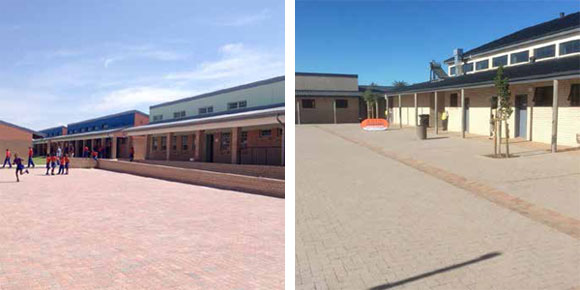 The handover of Valhalla Primary School, the Minister said, was not only a milestone, but significant as it would create a conducive learning and teaching environment for the learners and teachers at the school.
The handover of Valhalla Primary School, the Minister said, was not only a milestone, but significant as it would create a conducive learning and teaching environment for the learners and teachers at the school.
“What it will bring into the community is infrastructure that is versatile, that they can use it as a pubic hall so there is a good relationship between the school and the community. It means we are also bringing an asset to the community itself.
“For us it is an asset that we bring to the community. It is a lifelong infrastructure that creates a conducive working and learning environment for our kids with all the necessary facilities that are needed in the school,” she said.
The hand over was part of the R8.2 billion Accelerated Schools Infrastructure Development Initiative (ASIDI).
ASIDI is a massive public-private partnership programme that aims to replace about 510 schools nationwide that were not properly built.
Established in 1980, Valhalla Primary School was demolished and built from scratch at a cost of R34 million.
From a school that only housed 600 learners in 2006, it now accommodates 1 047 learners in 32 classrooms, which now boasts a library and a science laboratory.
A new soccer ground will be built in the area where the old structure was situated. Andrew Lochner, the school’s principal, said the new-look school would raise the bar of learning.
“It gave us just that hope to build a better future and I can say that the fact that we are in Elsies River doesn’t mean we need to settle for mediocrity.
“We need to tell learners and prove to learners that we need to raise the bar and build on a better future,” he said.
He added that the school was the pride of the community, and that he was excited at the news that his school was identified as part of the ASIDI programme.
“We will teach our leaners and we do hope that they will appreciate this building and that it will uplift them as learners. They must not wait for something to happen. They must get to a point where they will actually say ‘I will do my bit in order to make things happen’,” Lochner said.
Meanwhile in April this year, the department handed over the 100th school in Kroonstad in the Free State as part of the ASIDI programme.
The school is named after Dorrington Matsepe, the father of the late Communications Minister, Dr Ivy Matsepe-Casaburri.
It was established in 1992 and started with 500 pupils and 15 educators – today the school has 1 100 pupils.
Most pupils at the school are orphans, but despite these challenges, the school is performing well in the Annual National Assessments (ANA). Last year, it achieved a bronze in mathematics (60 – 69 per cent) and became one of the 50 top schools in the province.
QUICK FACTS |
|||
| A total of 106 schools have been completed to date:
|
Government tackles TB
Government tackles TB Estelle GreeffGovernment has launched a three-year mass tuberculosis (TB) screening campaign that will help to reduce the number of new infections and related deaths.
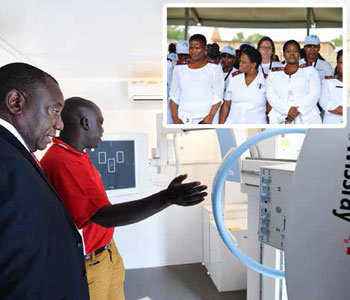 Deputy President Cyril Ramaphosa and Health Minister Dr Aaron Motsoaledi kicked off the screening campaign in the North West as part of World TB Day celebrated on March 24.
Deputy President Cyril Ramaphosa and Health Minister Dr Aaron Motsoaledi kicked off the screening campaign in the North West as part of World TB Day celebrated on March 24.
South Africa is the third most affected country in the world. The disease remains the number one killer in the country despite being both curable and preventable.
It is responsible for 120 000 deaths annually. Government wants to reduce this number to less than 20 000.
As part of the campaign, government will focus on key vulnerable groups with an elevated risk of TB infection. These include inmates in correctional facilities, mineworkers, communities in mining areas and children, especially those under five years.
“The poor socio-economic conditions that prevail in communities, especially poor housing and food insufficiency, provide a breeding ground for diseases such as TB, with children being particularly vulnerable,” said Deputy President Ramaphosa at the launch of campaign.
Early childhood development (ECD), the Deputy President said, can help to reduce infection among children and facilitate more effective detection.
Government also identified six priority districts for the screening campaign. These are Lejweleputswa in the Free State, West Rand in Gauteng, Sekhukhune and Waterberg in Limpopo and Bojanala and Dr Kenneth Kaunda in the North West.
The screening roll out will be done in phases. In the first year of this three-year campaign, Deputy President Ramaphosa said government will screen at least 135 000 inmates in correctional facilities and up to half a million mineworkers.
“In these six districts, we aim to screen around five million community members and 1.2 million children in schools, ECD centres and crèches.”
Government has already screened 59 000 inmates.
“This is a third of all sentenced offenders and awaiting-trial detainees. The programme is on track to screen more than 90 per cent by March 2017,” Deputy President Ramaphosa said.
The programme has also already screened 140 000 community members in the six districts. Nine inspectors have been appointed to assist the Department of Health to oversee the provision of TB services by the mines.
In the second year of the screening campaign, there will be an additional focus on metropolitan councils. In the third year, government will add the provinces of the Eastern Cape, Gauteng, KwaZulu-Natal and the Western Cape on its target list.
In order to ensure that TB patients on treatment take to and complete their treatment as prescribed by health workers, government will start a system to trace patients lost to treatment and also the contacts of known TB patients.
Also, more than 200 nurses have been trained to start patients on drug resistant TB medication, at decentralised sites.
Currently South Africa has 298 of these decentralised sites.
The Deputy President said bringing services closer to communities will also be a focus during the campaign as it is more convenient to patients and results in better treatment outcomes.
The focus of the campaign, he said, is not limited to screening and treating TB.
“We are focused also on reducing infection. All South Africans can act to reduce the likelihood of infection,” said the Deputy President, adding that something as simple as covering your mouth when you cough can make a huge difference.
Your blood can make a difference
Your blood can make a difference Estelle GreeffMany people don’t realise donating blood can make a world of difference to the lives of others. Donating a unit of blood is an important and much needed service that can save lives.
By donating blood, donors are helping the South African National Blood Service (SANBS) to have a supply of blood to help when a blood transfusion is needed urgently.
In South Africa a blood transfusion takes place every 48 seconds, a minimum of 810 000 units of blood are required annually to meet the South African demand.
A blood transfusion is a lifesaving medical procedure that is done to replace blood lost during surgery or due to a serious injury. A transfusion also may be done if your body can't make blood properly because of an illness.
Currently SANBS, a non-profit organisation that provides human blood for transfusion in South Africa, has a donor base of only 432 000, which is less than one percent of our population. This means that more donors are needed especially because the SANBS relies solely on donors who willingly donate blood to help save lives.
Who needs blood?
There is a daily demand for blood and there are many patients who need blood transfusion on a weekly basis to survive. Patients who need blood transfusions:
- Women who bleed due to pregnancy complications
- Children with severe anaemia
- Accident victims
- Surgical and cancer patients.
You cannot donate blood if you:
- Have low blood pressure
- Have high blood pressure
- Have low haemoglobin (iron)
- Are pregnant
- Have had surgery recently.
Are there any risks?
There are no risks when donating blood. A finger-prick test is done to check that your iron level is within a safe range to donate blood.
The materials used for blood donation, including the needle, blood bags, tubes and finger prick needle are new, sterile and disposable. Once they have been used they are dumped in a specialised waste container and destroyed.
People who participate in unsafe lifestyle behavior such as casual unsafe sex, male-to-male unsafe sex or taking intravenous drugs are advised not to donate blood.
Pre-donation tips:
- Eat a balanced meal at least four hours before you donate
- Check if you are legible to donate blood.
Post-donation tips:
- Eat well to increase your fluid intake for four to six hours:
- Do not smoke for at least 30 minutes
- Do not lift heavy objects with the arm used for donating, for at least two hours.
Hypertension: The silent killer
Hypertension: The silent killer Estelle GreeffMost people who suffer from hypertension often do not know that they have the condition.
Hypertension, which affects more than one in three adults worldwide, is commonly known as high blood pressure and causes nearly 50 per cent of all deaths from stroke and heart disease, according to the World Health Organization.
“High blood pressure is when the blood pressure in your arteries is persistently elevated. It is a very common condition… It is not only tense, stressed out people who suffer from it,” says Dr Stan Moloabi, Executive: Healthcare Management at the Government Employees Medical Scheme (GEMS).
“People may have hypertension for years without knowing it, which is why it can be so dangerous.”
World Hypertension Day is commemorated on the 17 May and health organisations and governments around the world use the day to create awareness.
The condition can also be responsible for cases of kidney failure, eye disease and dementia.
Blood: The life force behind your beating heart
Every time your heart beats, explains Dr Moloabi, blood is pumped into your body through the arteries. Blood pressure is the force of blood pushing up against the artery walls.
“This force is important as your blood has to deliver oxygen and nutrients throughout your body. However, if the pressure is high, then the heart has to pump harder, which can damage your blood vessels and cause health problems.”
Many factors can affect blood pressure.
“You have a higher risk of hypertension if you are older, as your blood vessels become stiffer as you age, and if you have a family history of high blood pressure.
“However, although you cannot do anything about these two factors, there are lifestyle causes that can definitely be controlled. These include aspects such as your weight, your eating and smoking habits and your alcohol and salt consumption.”
Know your numbers
Dr Moloabi stresses the importance of a blood pressure test.
“You should visit your family practitioner every one to two years for a blood pressure test, so that you can ensure your blood pressure is within the normal range, which is 120 over 80.”
However, Dr Moloabi advises that if you have diabetes, heart disease, kidney problems or if your previous blood pressure reading was higher than 120 over 80, then you must have your blood pressure checked at least once a year.
How to treat and prevent hypertension
Although there is treatment for hypertension, simple lifestyle changes can help you stop hypertension:
- Minimise your salt/sodium intake
- Exercise regularly
- Eat healthy meals
- Maintain a healthy weight
- Do not drink too much alcohol
- Do not smoke
- Lower your stress levels.
SA has animal health under control
SA has animal health under control Estelle GreeffSouth Africa is making good progress in maintaining its Foot and Mouth Disease (FMD) free zone status, says Agriculture, Forestry and Fisheries Minister Senzeni Zokwana.
The Department of Agriculture, Forestry and Fisheries, together with the provincial governments of Limpopo, Mpumalanga and KwaZulu-Natal, have finalised talks on infrastructure, specifically fencing and dipping tanks.
FMD is one of the most contagious animal diseases and causes deaths mainly in young animals through inflammation of the heart muscle.
The infected and protection zones are only found in the demarcated areas of Limpopo, Mpumalanga and KwaZulu-Natal provinces.
Minister Zokwana said the Scientific Commission for Animal Diseases (SCAD) of the World Organisation for Animal Health (OIE) stated that South Africa has made commendable progress to comply with the relevant requirements for the maintenance of its FMD free status.
“The SCAD made additional recommendations with regard to the separate dipping days in the FMD protection zone and the high surveillance area of the free zone in KwaZulu-Natal, that the dipping of cattle from the protection zone must be [done] after the cattle from the free zone.
“They also took note of the actions taken at the relevant abattoirs that slaughter animals from the protection zone, but would need clarification on how the veterinary services will ensure compliance and provide training to abattoir staff,” he said.
Minister Zokwana said next year, the first batch of veterinarians will be deployed to help expand the footprint in dealing with animal health issues.
Fencing & dipping tanks
As part of safeguarding animal health, Minister Zokwana said repair and maintenance of fencing is taking place on the South African/ Zimbabwe border, where more than 40 kilometres of border fencing has been completed.
As a temporary measure, cattle from the protection zones and the high surveillance area of the free zone in KwaZulu-Natal are now dipped on separate days.
He said for a more permanent solution on the issue, KwaZulu-Natal has prioritised funding to build 10 further dip tanks.
The KwaZulu-Natal Department of Agriculture and Rural Development also build the fences on the eastern boundary of Ndumo Game Reserve in an effort to prevent buffalo and cattle contact. The project is expected to be completed next month.
FMD vaccine
The Minister said a total of 300 000 doses of FMD vaccine were ordered from Botswana Vaccine Institute and distributed to Limpopo and Mpumalanga provinces.
The vaccination of cattle was expected to be completed by the end of March 2015.
“A further 300 000 doses were also requested to be produced by Onderstepoort Veterinary Institute (OVI) and the batch is expected to be delivered in April this year. Studies to assess the efficacy of the FMD vaccine are being carried out by OVI and a final report is expected soon,” he said.
Symptoms of FMD
Signs and symptoms and symptoms include: fever; nausea; vomiting; feeling tired; generalized discomfort; loss of appetite; and irritability in infants and toddlers.
Provinces partner for better rural development
Provinces partner for better rural development Estelle GreeffThe provincial governments of the Eastern Cape and KwaZulu-Natal (KZN) have partnered to strengthen agriculture and rural development in the country.
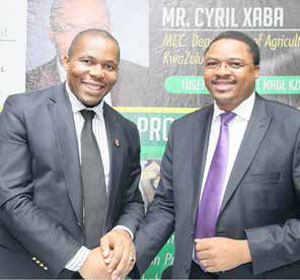 This comes after KZN MEC for Agriculture and Rural Development Cyril Xaba and Eastern Cape MEC for Rural Development and Agrarain Reform Mlibo Qoboshiyane agreed to work together to learn best practices and attract young people to the agriculture sector.
This comes after KZN MEC for Agriculture and Rural Development Cyril Xaba and Eastern Cape MEC for Rural Development and Agrarain Reform Mlibo Qoboshiyane agreed to work together to learn best practices and attract young people to the agriculture sector.
Through the agreement, young people in KZN who want to further their agricultural studies can do so at Tsolo Agriculture and Rural Development College in the Eastern Cape. The college was recently reopened to not only help attract and skill rural youth in agriculture, but also help communal farmers improve their farming skills.
The programme, which started in the 2015/2016 financial year, will see students from KZN being trained as animal health technicians at the college.
“Municipal boundaries separating the provinces should not deter cooperation between provinces which are serving the same government because collaboration will always ensure speedy service delivery. Agriculture will stimulate economic growth and open doors for the creation of jobs and poverty alleviation,” said MEC Xaba.
Both departments will share information and programmes on funding models for agricultural high schools. They will also work together to promote farming as a career among young people.
The MECs also agreed to work together to develop agro-processing and agribusiness in both provinces.
During his State of the Nation Address, President Zuma said government would promote the establishment of agricultural parks or cooperatives and clusters in each of the poorest district municipalities to transform rural economies.
The President said that an initial funding of R2 billion had been made available for the agricultural parks initiative. Agricultural parks are areas set aside specifically for agricultural activities to small farmers at reasonable cost with long-term tenure.
In light of this, the two provinces will work together to implement agricultural parks to attract potential investors into the two provinces.
“My department also learnt a great deal from MEC Qoboshiyane and his team. It is also through collaboration and cooperation that we will be able to transform the agricultural sector to ensure food security, economic growth and job creation in the country,” said MEC Xaba.
The MECs also agreed to host a sports week for all agricultural colleges in the two provinces later this year as well as other inter-provincial college sporting activities.
Mpumalanga villages benefit from water programme
Mpumalanga villages benefit from water programme Estelle GreeffThe Department of Water and Sanitation and Rand Water have partnered in a R298 million programme to provide water to 24 villages in Bushbuckridge, Mpumalanga.
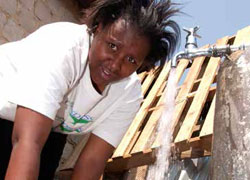 The Mpumalanga water programme has benefited 15 000 households in rural communities.
The Mpumalanga water programme has benefited 15 000 households in rural communities.
“A further R601 million is already being implemented as part of Phase 2 of the support to the municipality to benefit an additional 69 villages,” said Mpumalanga Premier David Mabuza.
Speaking at the opening of the Mpumalanga House of Traditional Leaders, he said the provision of basic services such as water, sanitation, electricity and proper human settlements was key to improving the quality of lives.
Premier Mabuza said municipalities have been tasked with ensuring that water supply is supplemented with boreholes in the coming months.
“Where boreholes exist but are non-functional, such boreholes shall be refurbished within the next three to four months in order to ensure that our people have access to water,” he said.
The province has set aside R186.2 million to address backlogs for the electrification of households in the province for the 2015/16 financial year as part of the Integrated National Electrification Programme.
“We are quite aware of the energy demands that this country faces,” said the Premier.
He added that government was implementing the Comprehensive Rural Development Programme to create job opportunities for communities in rural and tribal areas while providing food security at the same time.
Government had come up with the War on Leaks Programme, which is aimed at improving the sustainability of water supply.
“Youth development, through this programme, shall be key as those with minimum qualifications would not only enjoy access to job opportunities but would also benefit in our long-term skills development and refinement of technical expertise,” Premier Mabuza said. He added the provincial government would continue to support, strengthen all institutions of traditional leadership in the province to speed-up rural development, nation building and social cohesion within traditional communities.
“Government will continue to support the capacity building programme for traditional leaders to empower them with the requisite skills and competencies to contribute to economic growth and community development programmes in our tribal communities,” Premier Mabuza said.
Recognition for tackling sexual offences
Recognition for tackling sexual offences Estelle GreeffAfter spending 22 years as a police officer, Captain Madeleine van der Westhuizen never thought she would one day be named Detective of the Year.
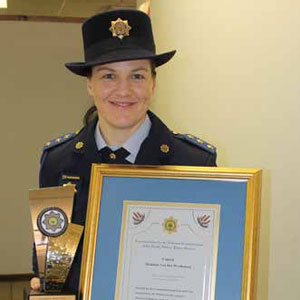 Capt van der Westhuizen won the award at the South African Police Service (SAPS) 2015 National Excellence Awards held recently at Emperors Palace in Johannesburg.
Capt van der Westhuizen won the award at the South African Police Service (SAPS) 2015 National Excellence Awards held recently at Emperors Palace in Johannesburg.
Although she is proud to have won the award, Capt van der Westhuizen says it was a team effort.
“I am honoured to be acknowledged; I really did not think I would win, especially since I was just doing my job.”
Capt van der Westhuizen is based at the Family Violence, Child Protection, and Sexual Offences (FCS) unit in Klerksdorp, North West.
She played an important role in investigating a case against parents who were accused of sexually abusing their three biological children.
When the case was opened in 2010 the children were aged 15, eight and seven. The teenager was diagnosed with cerebral palsy – a disorder that affects muscle tone, movement, and motor skills (the ability to move in a coordinated and purposeful way).
Educators at the children’s school noticed something was wrong with the children and contacted social workers.
In June last year, the 37-year-old mother of the three confessed and gave evidence in court following an investigation by Capt van der Westhuizen.
The Rustenburg Regional Court sentenced the mother to 12 life sentences and 20 years imprisonment.
What made this case unique, according to Capt van der Westhuizen, was that the mother was also accused of compelled rape.
“In this case compelled rape was when the mother of the kids gave her children to their father for him to rape them.”
In 2012 the then Department of Justice and Constitutional Development amended the Criminal Law (Sexual Offences and Related Matters) Act to include offences such as compelled rape.
Capt van der Westhuizen praised government for doing this because she believes that it has given the community a voice.
“This amendment is really for the good of the victim. I am very happy that it is making a difference in our society.”
Capt van der Westhuizen said this case would stay with her for a long time.
“This is one case I will always remember, everything that I had learned during my training as a police officer needed to be applied.”
Boosting the FCS units
The FCS unit under which Van der Westhuizen works was reintroduced in 2010. Nationally there are 176 established FCS units attached to all police clusters within the SAPS.
During the Sexual Offences Indaba held last year, Deputy Minister of Justice and Correctional Services John Jeffery said an additional 2 139 forensic social workers were appointed.
“These include 79 forensic social workers appointed to assist in cases of child sexual abuse by means of conducting assessments, compiling court reports and providing expert testimony in court as a means to strengthen the cases and increase conviction rates.”
According to the SAPS, the role of FCS detectives is to ensure the effective prevention and investigation of FCS-related crimes.
Crimes related to FCS are divided into sexual crimes, kidnapping, abduction, missing children less than12 years old and electronic media facilitated crime.
During the release of the 2013/14 crime statistics, National Police Commissioner General Riah Phiyega announced that there was a decrease in sexual offences crimes.
General Phiyega said sexual offences had decreased by 5.6 per cent for the 2013/14 financial year.
She added that there was an overall decrease of 6.3 per cent of all rape crimes in the country.
According to the SAPS, units such as the FCS have had a positive effect on incidences related to sexual offences.
These units have proved to be effective in helping victims and bringing offenders to book, increasing the public’s confidence in the police.
For more information on family Violence, Child Protecction and Sexual offences units visit: www.saps.gov.za
Imbizo puts spotlight on SA’s cyber security
Imbizo puts spotlight on SA’s cyber security Estelle GreeffExperts in cyber technology say care must be taken to balance the advancement of technology with safeguarding national security.
Stakeholders in this field, including think tanks, policy commentators and political analysts, met in Pretoria recently for discussions hosted by State Security Minister David Mahlobo.
Consensus is that because cyber technology is a borderless platform, this creates a breeding ground for more sophisticated threats such as cybercrime, cyber terrorism, cyber warfare and cyber espionage.
Government and the private sector agree that stronger partnerships must be formed to safeguard South Africa’s national security and its attraction as an investment destination.
The session formed part of the National Imbizo Focus Week, which saw several Cabinet Ministers and their deputies going to communities to explain government’s programme of action.
It interrogated the question of balancing the often competing rights of access to information with the obligation to uphold national security as well as perspectives on the role of intelligence in a democracy.
Minister Mahlobo committed government to strengthening the early warning systems to respond adequately to the ever changing domestic and global security issues.
He said government’s response is already well captured in the National Cyber Security Policy, which aims to promote a cyber-security culture and demand compliance with minimum security standards. It also strengthens intelligence collection through establishing public–private-societal partnerships.
However, citizens should serve as a powerful frontline defence, according to the commentators. This can be done through more public awareness and education on cyber security, cooperation and partnerships with civil society.
The importance of national cyber security was recently highlighted when a 15-year-old school girl from Cape Town was removed from a flight to Johannesburg by police recently under the suspicion that she was going to board an international flight to join the Islamic State (IS).
It is believed the teenager was actively engaging with IS recruiters on social media networks.
Other cases that highlight cyber security include the South African Police Service website hack in 2013 and system breaches at a number of government entities such as the South African Revenue Service, Postbank and the Alfred Nzo District Municipality.
Role of intelligence
The session also interrogated the role of intelligence in a democratic state as well as the definition of national interest.
Minister Mahlobo said national security has been defined in terms of the ability of any state to protect its interest from external threats.
These interests are broadly defined as territorial integrity, sovereignty and independence of the nation.
However, in a web of international relations the threat to security is not from one nation to another but also from other non-state sources of insecurity.
“We need to expand the traditional notions of security to address the non–traditional threats and so develop a comprehensive approach to security,” the Minister said.
It was for this reason that government extended the security paradigm to address the rapidly growing non-traditional threats like the struggle for resources embedded in the pursuit for energy security, environmental degradation, forced immigration and international terrorism.
On the question of the role intelligence in a democratic South Africa, the policy commentators questioned, “who then guards the guardians?”
The State Security delegation emphasised that South Africa is a country that has institutions and laws by which they have to oblige.
“The intelligence services have been given special powers but these powers must be exercised in accordance with legislation, regulations, guidelines and rules,” said Minister Mahlobo before reiterating that the Constitution is the supreme law of South Africa.
Minister Mahlobo said there is a need to appreciate the complex issue of secrecy in a time of heightened danger. He said transparency would be promoted where possible without compromising their operations.
| Internet, social media safety tips |
|
Parents have also been urged to ensure the safety of their children, who may be targeted on social media. The internet can be a dangerous place and social media websites are no exception, says the South African Police Service (SAPS). It shared the following to tips for parents:
|
New Build Programme creates jobs
New Build Programme creates jobs Estelle GreeffGovernment’s efforts to create jobs have been given a boost by the Build Programme, led by stateowned enterprises.
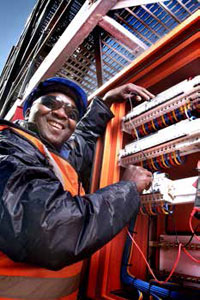 Transnet and Eskom are set to invest billions of rands in infrastructure programmes to create an enabling environment for private sector investment, boosting localisation and supporting small and medium enterprises.
Transnet and Eskom are set to invest billions of rands in infrastructure programmes to create an enabling environment for private sector investment, boosting localisation and supporting small and medium enterprises.
Speaking in Parliament, Matsietsi Mokholo, the Department of Public Enterprises’ Acting Director-General, said the Build Programme has also helped government address infrastructure backlogs that have delayed investment in the economy.
“The state of our electricity, ports and rail infrastructure is a clear sign that there has not been enough investment in our infrastructure and we have had to play catch up.
“The Build Programme has been helping us do just that.”
Creating jobs
As part of the Build Programme, Eskom has since 2005 been expanding its generation and transmission capacity to meet the country’s growing demand for energy.
In his State of the Nation Address, President Jacob Zuma said electricity supply security is a catalyst to growth and job creation.
Makgola Makololo, the department’s chief director responsible for energy, said Eskom has contributed to its developmental mandate through the creation of direct and indirect jobs.
While the direct jobs have been created within the power utility’s business environment, the indirect jobs have come from contractors servicing Eskom, especially through the build projects.
“Over the past three financial years, Eskom suppliers have committed to create 7 000 jobs and retain 700 jobs when they are awarded a contract.
“As a direct result of Eskom business in the New Build projects, there were 24 251 jobs created by suppliers in Medupi, Kusile, Ingula and the Power Deliver Project at the end of December 2014,” she said.
She added that Eskom had set a target to create more jobs through the New Build Programme in its corporate plan – 16 334 in the 2014/ 15 financial year, 8 317 in 2016, 4 750 in 2017 and 2 000 in 2018.
Transnet on track to create jobs
Transnet has set a goal to roll-out a capital investment programme over a seven year period to contribute to skills development, job creation, localisation, empowerment and transformation.
Kgomotso Modise, the department’s Deputy Director-General responsible for transport, said with the vision of moving freight from the road to rail, while the investments will go towards ports and pipeline infrastructure, a bulk of it will go towards rail.
She said most of these projects would be fasttracked as part of Operation Phakisa, a model which President Zuma introduced in June last year to speed-up the delivery of services in the oceans economy and in clinics as part of the first two phases.
Modise said Transnet aimed to create R1 million jobs by 2022.
“Transnet will create approximately 540 000 direct and indirect job opportunities over the next seven year period.
“Through the build programme, procurement spend will be leveraged to increase localisation and therefore maximise job creation.
“In addition, it is also expected that another 480 000 job opportunities will be induced through Transnet spend.”
With an overall investment of R1 billion a year to be spent on training over the next seven years, Transnet will train 3 000 artisans and 1 600 engineers over that period.
Port Ngqura creates jobs in E Cape
Port Ngqura creates jobs in E Cape Estelle GreeffThe Port of Ngqura is playing an important role in growing the economy and creating jobs in the Eastern Cape.
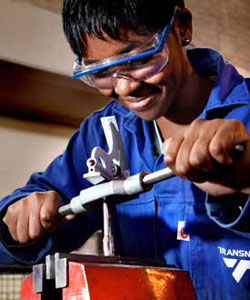 Speaking at the Ngqura Container Terminal’s 5th anniversary and expansion programme milestone, Public Enterprises Minister Lynne Brown said the port managed to create over 800 permanent jobs in the province.
Speaking at the Ngqura Container Terminal’s 5th anniversary and expansion programme milestone, Public Enterprises Minister Lynne Brown said the port managed to create over 800 permanent jobs in the province.
The Minister officially opened berths 3 and 4 at the Ngqura Container Terminal, marking a significant step in Transnet’s drive to expand capacity at the port, while confirming the company’s position as a leading and committed partner in the economic development of the province. Berths are where vessels dock.
The state-owned transport and logistics company invested in the building and deepening to 16 meters of the container terminal’s two additional berths and purchase of port equipment, including two megamax ship-to shore-cranes, 18 rubber tyred gantries, 48 haulers and 48 bathtub trailers at the port.
“I am pleased that the port has contributed towards job creation in the area of the Eastern Cape. To date, more than 825 permanent jobs have been created since the operationalisation of the port in October 2009,” explained the Minister.
She added that the creation of decent jobs was a priority of government.
Additionally, the port has also contributed towards the transformation of the economy.
“To date, the port’s procurement spend is recorded at R900 million of which R740 million is Broad-based Black Economic Empowerment spend,” said the Minister.
The transformation of the economy was also a top priority area for government.
“We cannot undermine our investment towards building and developing our black suppliers. The creation of strong black industrialists shall remain top of the agenda of our government,” she said.
The Minister also paid tribute to Transnet for its commitment to the port, which has also benefitted from being an Industrial Development Zone.
“It’s designation as a special economic zone has supported a broader-based industrialisation growth path in South Africa, while helping the country achieve the objectives as outlined in the National Development Plan (NDP).
“I would like to congratulate Transnet for investing about R14 billion in building and developing the Port of Ngqura. This includes the latest investment of R2 billion…” she added.
SA needs more artisans and engineers
SA needs more artisans and engineers Estelle GreeffPublic Enterprises Minister Lynne Brown says stateowned companies like Eskom and Transnet have and continue to create jobs in communities where they operate.
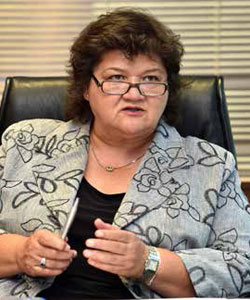 In an interview with Vukuzenzele, the Minister also called on the companies to play a bigger role in skills development, job creation and inequality and poverty alleviation, and said they should aim to train not less than 1 000 artisans and engineers per year.
In an interview with Vukuzenzele, the Minister also called on the companies to play a bigger role in skills development, job creation and inequality and poverty alleviation, and said they should aim to train not less than 1 000 artisans and engineers per year.
“Last year alone, Transnet trained 1 000 artisans and they have a localisation programme, they train engineers and they train welders.
“In terms of the localisation programme, wherever they work, they employ people from the communities,” she said.
The Minister said that this year, Transnet and Eskom made R9 billion and R7 billion in profits respectively, and that as a shareholder, she expects them to train more artisans and engineers.
“They set themselves a target each year in the shareholder’s compact with me.
“When I sign off this year, I am of the opinion that every one of the companies cannot set themselves a target of less than a thousand trainees a year. In fact, the larger co
Government supports black industrialists
Government supports black industrialists Estelle GreeffThe Department of Trade and Industry (the dti) will launch a R1 billion incentive scheme in support of the Black Industrialist Programme.
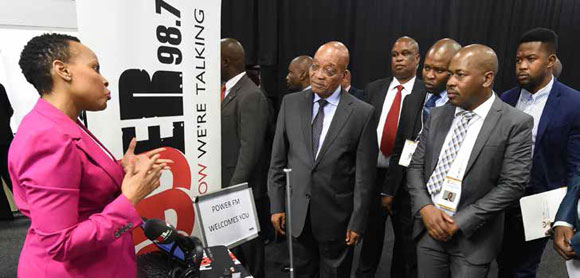 The programme aims to give black business people access to productive sectors such as transport, green industries, agro-processing, biofuels and chemicals.
The programme aims to give black business people access to productive sectors such as transport, green industries, agro-processing, biofuels and chemicals.
It aims to fund 100 sustainable projects in need of funding or looking to grow their businesses in an effort to create more competitive black industrialists across the country.
An industrialist is a person who owns or manages an industrial enterprise that manufactures goods and services on a large scale. Industrial enterprises help to grow the economy and create jobs.
The dti says despite the strides made, black industrialists are still small players in the mainstream economy and more needs to be done to change that.
“There is a need to expand the base of entrepreneurs and industrialists from the current small base of mainly white entrepreneurs and industrialists.
“The black majority need to produce more and more entrepreneurs and industrialists as a way of creating multiple avenues for channelling economic opportunities and benefits to the black population,” said the department in a statement.
Speaking at the Black Industrialist Indaba in Midrand recently, Minister of Trade and Industry Dr Rob Davies said that government was committed to making the economy more accessible by speeding up the development of black industrialists.
Black entrepreneurs and industrialists often struggle to access finance from development financial institutions. Minister Davies said: “It is time to change this to help government to create more and competitive industrialists”.
He said the tendency of development financial institutions had been to employ similar measures as those of commercial banks in determining eligibility for credit access.
“There is a need to systematically align the respective functions of these development finance institutions towards a quantitative black economic empowerment output that will alternatively alter the racial balance of industrial ownership,” the Minister said.
The Indaba came up with four recommendations that would help government to speed up the growth of black industrialists:
- Establish a committee comprising government, private sector and experts to explore more ways and instruments to accelerate the implementation of the Black Industrialists Development Programme.
- Review the Preferential Procurement Policy Framework Act of 2000.
- Set up the black majority threshold at 75 per cent for companies qualifying for the programme.
- Ensure that skills development is at the centre of the programme.
Govt backs community broadcasters
Govt backs community broadcasters Estelle GreeffCommunications Minister Faith Muthambi says government will continue to nurture its relationship with community broadcasters, and has to date supported the sector with over R400 million.
“We will continue supporting their signal distribution costs and equipment infrastructure. We will also assist the sector in training their production and news teams in reporting and producing content for the upcoming local government elections,” she said.
Speaking at the 6th MTN Radio Awards held at the Sandton Convention Centre recently, Minister Muthambi said she believes that radio is the most effective tool that can be used to convey information to the people, especially information about nation building.
Minister Muthambi called on CEOs, programme managers and station managers to look at how they could partner with government, especially the Departments of Communications and Arts and Culture in promoting nation building and social cohesion.
The Minister said she would issue a directive to the Media Development & Diversity Agency (MDDA), SABC and officials from her department to work with the National Association of Broadcasters and National Community Radio Forum to come up with strategies to promote social cohesion.
“We will use our programme production funds to prioritise these initiatives and ensure that these programmes are [aired] on community and commercial radio stations because of their proximity to the communities experiencing [attacks against foreign nationals],” she said.
The Minister strongly condemned the incidents of violence against foreign nationals, saying this should not happen considering South Africa’s difficult past.
“I … am convinced that you are all going to join me in condemning the senseless attacks, killings and harassment of our African brothers and sisters by our fellow South Africans.
“This is not the freedom that Tata Mandela, Sisulu, Tambo, Luthuli, Makgatho, Mahlangu and Chabane fought for,” she said.
Several campus, community and commercial radio stations were among the big winners of the evening.
SAfm, Motsweding FM, 702, Tuks, Thobela FM and Jacaranda FM were among the winners for their programming, which ranges from afternoon drive shows and talk shows.
The MTN Radio Awards aim to recognise excellence in radio, with the objective of ensuring that radio remains one of South Africa’s foremost media choices.
It’s also about rewarding individuals and organisations who combine talent, hard work and skill to ensure that their listeners are compelled.
Government fighting social grant fraud
Government fighting social grant fraud Estelle GreeffOver 1 000 people attended a South African Social Security Agency (Sassa) anti-corruption conference outside Pretoria in March. The goal was to strengthen the partnerships between organisations and government departments that are fighting fraud in the social security sector.
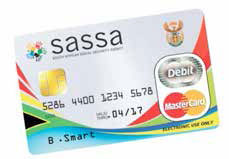 Sassa is responsible for the management of funds provided by government to use for grants aimed at making a difference in the lives of society’s vulnerable.
Sassa is responsible for the management of funds provided by government to use for grants aimed at making a difference in the lives of society’s vulnerable.
The mistreatment and abuse of vulnerable grant recipients is on the increase and is worth millions of rands.
Sassa’s role in fighting fraud and corruption
Sassa has taken a radical approach to fight fraud and corruption by introducing physical barriers to restrict employee movement, split authorisation, a staff vetting system and new biometric system to overcome the problem of insecure passwords.
Re-registration and the introduction of the biometric payment system gave Sassa a credible database of beneficiaries, said Social Development Minister Bathabile Dlamini, adding that over 300 000 fraudulent grant payments had been cancelled, including duplicated grants, and over 700 000 child recipients had been removed because they could not be presented by their primary caregiver for re-registration.
Sassa’s Fraud Prevention Strategy includes tools appropriate reporting tools and whistleblowing to help identify fraud and corruption.
“There has also been progress in fostering an ethical organisational culture, increasing cooperation with other agencies and improving policies, procedures and internal controls,” said the Minister.
The Fraud Prevention Strategy is working: the number of cases reported has dropped. There were 8 000 fraud and corruption cases for 2012/13. These include investigations of prior years not previously captured on the Fraud Case Management System.
Of these, as at 31 January 2015, 1 919 had been closed and 5 145 had been finalised. There are 670 cases outstanding. The value of the finalised investigations is R87 490 444 and R1 207 833 has been recovered by the regions.
“Between 1 April 2013 and 31 March 2014, more than 3 571 cases were captured on the Fraud Case Management System; at the end of January 2015, only 1 072 cases had been captured. During the same period 1 522 cases were closed and 486 finalised (worth R18 092 347 of which R455 054 was recovered),” said Minister Dlamini.
Protect yourself
Sassa’s Dianne Dunkerley, executive manager: grant policy support says Sassa does not sell funeral policies or give loans and does not expect you to buy a funeral policy.
“If someone tries to make you buy a product or sign something you don’t understand, ask Sassa for help. And do not give your card’s secret PIN code to anybody,” emphasises Dunkerley.
Stamping out fraud is going to take an effort from government and community.
“Where there is corruption there are communities. Communities have a role to play in spotting suspicious behaviour and reporting it,” said Minister Dlamini.
If you are a victim or suspect fraud you can report it anonymously on: 0800 701 701
Government reaches out to communities
Government reaches out to communities Estelle GreeffCommunications Minister Faith Muthambi says communities must take advantage of the opportunity to interact with government leaders whenever izimbizo are held in their communities.
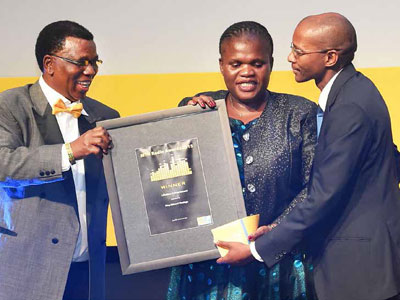 The Minister was speaking during the start of Imbizo Focus Week that took place across the country. Izimbizo give communities an opportunity to listen to political leaders as they explain the priorities of government as outlined in the State of the Nation Address.
The Minister was speaking during the start of Imbizo Focus Week that took place across the country. Izimbizo give communities an opportunity to listen to political leaders as they explain the priorities of government as outlined in the State of the Nation Address.
Izimbizo are also held to encourage communities to play their part and implement the National Development Plan, and support government’s commitments that the country moves forward to achieve Vision 2030.
It’s also an opportunity to measure progress made on government’s priority programmes.
Imbizo programme
Minister Muthambi said the imbizo programme is continuing to grow as they take government’s Programme of Action to the people and listen to communities’ needs.
“This is an important part of accounting to our people and clarifying government’s policy,” said Minister Muthambi.
During the Imbizo Focus Week that took place in April 2015, government achieved more than 70 imbizo engagements.
“We will sustain these through the year,” she said.
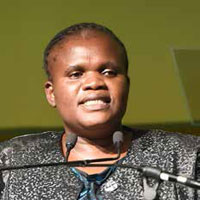 Minister Muthambi encouraged communities to interact with government to ensure that they get the services they need. She called on political representatives to reach out to communities to listen to their concerns.
Minister Muthambi encouraged communities to interact with government to ensure that they get the services they need. She called on political representatives to reach out to communities to listen to their concerns.
“When we say our government cares, we mean it. We are a government that listens. We take your concerns seriously. We are committed to addressing your concerns,” the Minister said.
She also encouraged community members to interact with their local representatives.
“As a community member, you have a role to play. Speak to us.”
She said communities must use the platforms that the provincial government had created for them to interact and raise their concerns.
The Minister also cautioned that when people are using these platforms, they must not only complain but also appreciate what government is doing for them.
Support for community media
Community media also play an important role in ensuring that government is able to talk directly with communities.
Minister Muthambi says government will continue to develop its relationship with community broadcasters, and has to date supported the sector with over R400 million.
“We will continue supporting their signal distribution costs and equipment infrastructure. We will also assist the sector in training their production and news teams in reporting and producing content for the upcoming local government elections,” she said.
Speaking at the 6th MTN Radio Awards held at the Sandton Convention Centre recently, Minister Muthambi said that radio is the most effective tool that can be used to convey information to the people, especially information about nation building.
Minister Muthambi called on CEOs, programme managers and station managers to look at how they can partner with government, especially the Departments of Communications and Arts and Culture in promoting nation building and social cohesion.
Government support for community media is unwavering, the Minister said, with more than R36 million of government advertising allocated to community media through media bulk buying.
The Minister said this investment makes a significant contribution to the sustainability of community media.
She added that the GCIS and MDDA would engage with Premiers to see to it that the 30 per cent advertising spend earmarked for community media is divided properly.
Rewarding broadcasting excellence
The MTN Radio Awards aim to recognise excellence in radio, with the objective of ensuring that radio remains one of South Africa’s foremost media choices.
Several campus, community and commercial radio stations were among the big winners at the awards.
SAfm, Motsweding FM, 702, Tuks, Thobela FM and Jacaranda FM were among the winners for their programming, which ranges from afternoon drive shows and talk shows.
The awards are also about rewarding individuals and organisations that combine talent, hard work and skill to ensure that their listeners are compelled.
South Africa goes digital
South Africa goes digital Estelle GreeffBroadcasters, network operators and TV viewers will benefit from South Africa’s move from analogue to digital TV.
The process of moving from analogue to digital is known as digital migration, introduced by government to better communicate their message to all South Africans.
Analogue TV was first introduced to South Africa many years ago when the first TVs were made. A digital TV, however, is the modern TV set.
All South Africans will access digital TV through set-top boxes (STBs), which will be connected to an analogue TV to run digital streaming.
One of the advantages of digital TV is that more channels would be available at a cheaper price. It also makes for better broadcasting, picture quality and TV reception.
With digital TV the SABC aims to have channels set for specific genres. For example, a health channel that will only have health topics or an education channel that will only have educational programmes.
Government will provide free STBs to over five million disadvantaged TV-owning households. The bulk or 1.2 million will be distubuted in Gautheng , followed by KZN and Limpopo. STBs will allow all South Africans to transfer from analogue TV to digital TV.
Each STB is uniquely made for South African broadcasting and will have a unique code that will block it from being used across the borders of South Africa.
Households with decoders for Top TV and DStv need not buy an STB.
The South African Post Office will be responsible for delivering the STBs while the South African Social Security Agency and Statistics South Africa will approve those who qualify for a free STB.
Each STB comes with a guarantee from the manufacturer. If it is damaged before the expiry date of the guarantee, the manufacturer is expected to fix it.
All manufacturers who have passed the South African Bureau of Standards (SABS) quality assurance tests will be able to manufacture approved STBs. Manufacturers who are not recognised by the SABS will not be allowed to manufacture STBs.
All STBs will display a sticker showing that they were manufactured in South Africa.
For more information on digital migration visit: www.doc.gov.za
Female matriculants to take to SA skies
Female matriculants to take to SA skies Estelle GreeffYouth matters
The Air Traffic and Navigation Services (ATNS) has offered a once-in-a-life-time opportunity to 24 young female matriculants to undergo specialised aviation training to become Air Traffic Controllers (ATCOs).
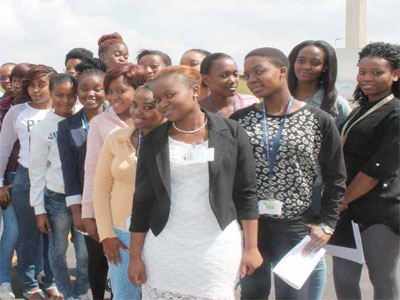 The group completed an intensive four-week induction course that included visits to airports in and around Gauteng.
The group completed an intensive four-week induction course that included visits to airports in and around Gauteng.
ATNS Head of External Corporate Communications, Percy Morokane, said the trainees have gone through a rigorous regime of assessments (including thorough medicals) to meet specified international requirements to become ATCOs.
“As part of its recruitment drive, ATNS has put effective transformation programs in place, primarily to increase access to high quality training and skills development opportunities, which will enable women to effectively participate in the economy and reduce inequalities.
“ATNS’ recruitment objectives are aimed at achieving the fundamental transformation of inequities linked to class, race, gender, age and disability in our society – to mention but one,” he said.
Morokane said over the next two years, the group will go through a technology-intensive internationally-accredited Air Traffic Management course, which will enable them to become fully fledged ATCOs.
Recent research regarding transformation indicates that the aviation industry still reflects huge disparities between men and women.
“Occupations held by women, and nonwhite employees are located in the semiskilled occupational levels. Notably, major changes have taken place in ‘senior management’ occupations.
“This category has gone through rapid transformation during the last decade or two, with the inclusion of more black employees as well as female, younger and intermediate skilled workforce.
“Changes in other occupational categories, particularly those related with technical skills, such as Air Traffic Control have been very limited,” he said.
Morokane said a particular challenge facing the industry is increasing the participation of young people, particularly females in the technical occupational categories.
“Meeting the future demand of technical skills in the sector largely depends on the correction of these imbalances by critical role-players such as ATNS.
“This intake is a first of its kind because historically, ATCOs were integrated with other aviation careers streams – such as Aeronautical Information Management and Assistant Air Traffic Officers. This was as a result of a very low number of qualifying candidates,” he said.
Millions set aside to help youngsters
Millions set aside to help youngsters Estelle GreeffYouth matters
Improving education in South Africa has always been on the list of priorities of government over the years. It is also among the long-term goals that government has outlined in its Vision 2030.
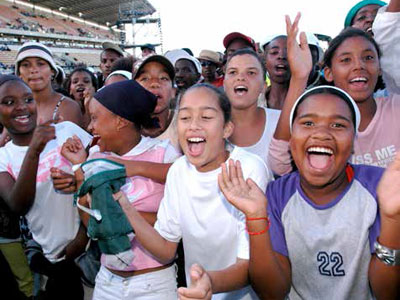 The National Development Plan (NDP) states that South Africa needs a highquality education system with global competitive literacy and numeracy, and higher education and training that enables citizens to fulfil their potential.
The National Development Plan (NDP) states that South Africa needs a highquality education system with global competitive literacy and numeracy, and higher education and training that enables citizens to fulfil their potential.
The NDP also says that in order improve the education system, there is a need to expand the higher education sector so it can contribute to rising income, higher productivity and the shift to a more knowledge-intensive economy. It also states a need for a wider system of innovation that links universities, science councils and other research and development role players with priority areas of the economy.
To address these education demands, the National Youth Development Agency (NYDA) this year launched its Second Chance Matric Rewrite programme that aims to reintegrate young people who failed Grade 12 back into the education system.
NYDA Chairperson Yershen Pillay spoke to Vuk’uzenzele about the programme, which is aligned with the agency’s new focus on education and skills development.
“We have taken an approach as the NYDA that every matric pupil deserves a second chance, for whatever reasons, especially those in rural areas,” he said.
Pillay holds the view that the majority of matriculants who did not pass the National Senior Certificate (NSC) examinations may actually have potential to further their studies and become future academics.
“The aim of the programme is to afford those who have failed the NSC examinations a second chance to rewrite and obtain that valuable qualification.
“We know for a fact that about 128 000 or more full-time candidates failed the NSC exams in 2014, and we need to reintegrate as many as possible into the education system,” said Pillay.
The NYDA is targeting 4 325 young people in the nine provinces with a budget of R10 million injected in the programme. The closing date for registrations for this programme was 20 February.
The number of candidates targeted is based on affordability and the agency has proposed to get a boost from government for the years ahead.
“We are partnering with the Education Training Development Practitioner Sector Education Training Authority (ETDP Seta) to roll out this programme. As part of the partnership, the NYDA contributed R7 million and ETDP Seta contributed R3 million this year. With that R10 million available, we are able to reach only the targeted number in all nine provinces,” Pillay said.
The programme is structured in a way that best suits every province and there are tuition centres based in each province. In provinces that have performed poorly, such as in the Eastern Cape and Limpopo, there are five centres.
Holistic support
The centres are designed for the Second Chance Matric Rewrite programme only and to accommodate the targeted number that will benefit from the holistic package of support to write at these centres.
“It is a holistic package of support with six aspects to it, which includes tuition of 52 hours of subject, study guide, career guidance, previous examinations question papers, academic support and three assessments per subject.
“Each learner will receive this package of support and will be assisted to register with the Department of Basic Education (DBE) before they sit for final examinations in November this year,” Pillay said.
He encouraged young people to take matric seriously as it is an important qualification to have.
“It doesn’t guarantee you success but it is a passport to success. You need to ensure that you get that valuable certificate and programmes of this nature, which are offered free by the NYDA, are opportunities that young people need to seize.”
Pillay envisages that the programme will be sustainable, and said the NYDA has tabled a proposal to Cabinet – through the Deputy Minister in The Presidency, Buti Manamela, because it needs to be scaled up as a government programme.
He said this was necessitated by the fact that the NYDA did not have enough resources to escalate the number from 4235 to 128 000 youth who needed this kind of support.
“If government is able to scale up this project and run with it, with all government departments contributing towards its success, then we will actually have the ability to meet the demand that is out there… We will be able to have a significant impact made by this programme, and that is our long-term vision,” said Pillay.
Focus on skills development
In May 2013, the NYDA shifted the core business away from Enterprise Finance and Skills Development towards Education and Skills Development.
The strategic change towards Education and Skills Development was informed by numerous studies indicating that most young people in the country actually derive their income from salaries and remittances.
According to the NYDA, only 4.6 per cent of young people between the ages of 15 and 24 derive their income from business-related activities. The studies further indicate that the level of education and the quality of that education is directly proportional to employability.
It is hoped that the programme will decrease the educational challenges facing young people in the country, which speaks to what government envisioned in the NDP.
According to the NDP, South Africa loses half of every group that enters the school system by the end of the 12-year schooling period, wasting significant human potential and harming the life chances of many young people.
Youth say YES to green jobs
Youth say YES to green jobs Estelle GreeffA few months ago, Jeannette Hlongwane, 28, had no clue that 20 plastic bottles could be used to make a T-shirt from the polyester found in the plastic.
Hlongwane, who lives in Makapanstad in North West, is currently enrolled with the Youth Environmental Service (YES) programme. “Makapanstad is a rural area and very few people know about the importance of looking after our environment and recycling. The programme has taught me a lot about the benefits of recycling, agriculture and the overall environmental management.
“I had no idea that some clothing materials are not 100 per cent cotton and a portion of the production of clothing is made from polyester, which comes from plastic. These are some of the things that the YES programme has taught me,” says Hlongwane. The programme is funded by the Department of Environmental Affairs in partnership with Delta Environmental Centre, an environmental education, training and consultation organisation.
The YES Programme builds the nation by involving young people in environmental services.
They get skills they can use to take up jobs and opportunities in the sector once they complete the programme.
Hlongwane says she saw an advert in the local newspaper last year where the Department of Environmental Affairs was looking for people to enrol in the programme.
She applied and started the 12-month programme in January this year. The programme has helped her financially because she receives a monthly stipend of R1 600.
“I had been unemployed for two years and in this area there aren’t any prospects for careers or education. The programme has given me an opportunity to provide for my children. I feel empowered and I am very happy to have received this opportunity.”
Martha Molubi, 25, another beneficiary, says YES has not only given her hope, but it has also empowered her with skills in the environmental sector.
Molubi was forced to stop her studies because of the financial situation at home.
“This programme teaches us a number of aspects such as agriculture and waste management. My favourite is the agricultural section of the programme. I have a dream of one day starting my own farm. This is a stepping stone,” says Molubi, who is also from Makapanstad.
The Department of Environmental Affairs started the Youth Service Programme as a Presidential programme in 2003. The aim was to empower young people and give them access to new opportunities for employment, income generation, skills development and personal development to help them contribute to building South Africa.
When Minister of Environmental Affairs Edna Molewa tabled her 2013/14 Budget Vote, she said the YES Programme would benefit 2 700 people.
“Upon exiting the programme, these young people will be placed in either permanent employment or further training institutions.” Malusi Vatsha, Project Manager from Delta Environmental Centre, says the programme is also accredited by the Education, Training and Development Practices Seta, meaning that after completing the programme, the young people can further their studies at higher education institutions.
Participants of the YES Programme are given theory and practical training.
“For example, they will be taught about waste management in the classroom and as an assignment, they will be expected to visit a waste management company and partner with it,” says Vatsha.
To be able to qualify to be part of the programme, participants need to have matric and live in a rural area.
“Environmental management is not common in most rural areas.
This programme is an opportunity to promote green jobs,” says Vatsha.
Hlongwane also agrees, saying in most rural areas people usually burn waste not knowing that it can be turned into fortune.
“I would love to open a waste management centre. There is no recycling centre in this area. It is my dream to start something of this nature,” she says.
Denel invests in skills development
Denel invests in skills development Estelle GreeffDenel is investing millions of rands in education and training to ensure that the country meets its demand for skills and that the economy continues to grow.
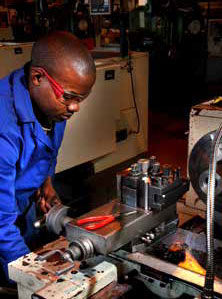 Artisan training provided by Denel SOC at its campus in Ekurhuleni is helping to meet South Africa’s huge demand for skilled human resources in technical fields.
Artisan training provided by Denel SOC at its campus in Ekurhuleni is helping to meet South Africa’s huge demand for skilled human resources in technical fields.
This is according to Chief Executive of Denel Aviation, Mike Kgobe, who was speaking at an event to celebrate the achievements of students who were trained at the Denel Technical Academy (DTA).
A total of 235 students, who completed their first year of training at the DTA, will now serve apprenticeships at various companies and organisations before returning to Denel to complete their studies and qualification.
The country’s tertiary institutions must train at least 30 000 artisans each year to ensure that the country’s economy grows and that there is enough support for government’s big infrastructure projects. This is the target to be achieved by 2030, according to the recommendations contained in the National Development Plan.
Located next to the OR Tambo International Airport, the DTA has built a solid reputation for the quality of artisans and skilled technicians it delivers to serve the aviation industry. In recent months, the academy has expanded the scope of courses it offers to include other engineering and technical sectors.
Kgobe said Denel was committed to playing a leading role in the training of skilled engineers, artisans and technicians.
The Denel Group allocates more than R64 million a year to its “Talent Pipeline Model” that starts with mathematics and science programmes for high school learners and continues through to bursaries for tertiary studies, internships and mentoring programmes.
“For our country to achieve high levels of economic growth and address our social challenges of poverty, unemployment and inequality, we must work together to invest in education, training and skills development to achieve our vision of a skilled and capable workforce,” said Kgobe.
Ngubo turns business dream into reality
Ngubo turns business dream into reality Estelle GreeffWhen Namhla Ngubo decided to go overseas after completing her studies to gain experience in the food and beverage industry, she had no idea that experience would motivate her to start her own business.
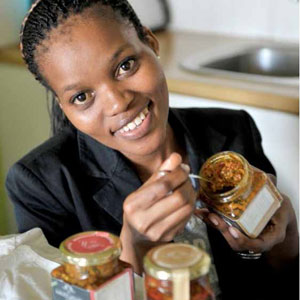 Ngubo is the owner of Harvest from Heaven, a Durban-based company that manufactures curried chillies and peri-peri sauce. It supplies local supermarkets, caterers, shisa-nyama eateries and flea markets.
Ngubo is the owner of Harvest from Heaven, a Durban-based company that manufactures curried chillies and peri-peri sauce. It supplies local supermarkets, caterers, shisa-nyama eateries and flea markets.
The company received a R49 000-inventory for her business through the Business Development Grant from the National Youth Development Agency (NYDA).
This NYDA Grant Programme is an incubator programme for young entrepreneurs to help them to either start or to grow their businesses. Funding of up to R100 000 is available for youth-owned businesses.
Thirty two-year-old Ngubo completed her National Diploma in Food and Beverage studies and her BTech in Business Administration.
She then worked on cruise ships and at different restaurants overseas, and this exposure to a whole new world helped to inspire her to start her own business.
“I decided to do something with the experience that I gained while I was abroad. I just needed to find something to do to sustain myself.”
In 2012, Ngubo started her business and gave it an interesting name, Harvest from Heaven.
“When you plant a seed, you have to wait a while for it to grow. It’s not something that happens overnight. You have to be really patient with your dreams and vision.”
The business started off slowly only selling curried chillies but in 2013, Ngubo decided to diversify her products, which are sold to local businesses. The business now has a manufacturing place and employs five people.
Ngubo said since starting her business she has faced challenges because the food industry is complex and one needs to comply with health regulations. However, she overcame these challenges by staying committed to her vision and wanting to see her business succeed. “I had to be committed to what I wanted and I just had to persevere. Having a mentor as well made it easier for me,” said Ngubo.
Through her business ventures Ngubo says she has learnt and gained so much.
“I have built professional business relationships with others and my knowledge has expanded. This helps me overcome challenges because I have the exposure and experience where needed.”
Ngubo's advice for young entrepreneurs is simple.
“Don’t go where everyone is going, it causes a traffic jam, rather go where no-one went and you will be successful. In life you have to dream and you have to be persistent, never give up.”
Jobs: National Prosecuting Service
Jobs: National Prosecuting Service Estelle Greeff
| NATIONAL PROSECUTIONS SERVICE | |
| POST: | SENIOR PUBLIC PROSECUTOR |
| SALARY:
CENTRE: |
R 713 583.00 per annum (Total Cost Package) to R 1 115 409.00 per annum (Total Cost Package) (Level CM-1) DPP: Cape Town (Recruit 2015/71) |
| POST: | SENIOR STATE ADVOCATE X3 |
| SALARY:
CENTRE: |
R 713 583.00 per annum (Total Cost Package) to R 1 115 409.00 per annum (Total Cost Package) (Level LP-9) DDPP: Bisho (Recruit 2015/72), DDPP: Thohoyandou (Recruit 2015/73), DPP: Cape Town (Recruit 2015/74) |
| POST: | STATE ADVOCATE |
| SALARY:
CENTRE: |
R 554 025.00 per annum (Total Cost Package) to R 919 116.00 per annum (Total Cost Package) (Level LP-7 to LP-8) DPP: Mmabatho (Recruit 2015/105) |
| POST: | HEAD CONTROL PROSECUTOR 2 |
| SALARY:
CENTRE: |
R 367 047.00 per annum (Excluding Benefits) to R 865 968.00 per annum (Total Cost Package) (Level SU-1 to SU-2) CPP: Port Elizabeth (Alexandria) (Recruit 2015/76) |
| POST: | REGIONAL COURT PROSECUTOR X8 |
| SALARY:
CENTRE: |
R 367 047.00 per annum (Excluding Benefits) to R 865 968.00 per annum (Total Cost Package) (Level LP-5 to LP-6) CPP: East London (Recruit 2015/77), CPP: Thohoyandou (Musina) (Recruit 2015/78), CPP: Pinetown (Ntuzuma) (Recruit 2015/79), CPP: Mitchells Plain (Strand) (Recruit 2015/80); CPP: East London (Mdantsane) X2 (Recruit 2015/84); CPP: Mmabatho (Molopo) (Recruit 2015/85); CPP: Odi (Ga-Rankuwa) (Recruit 2015/86) |
| POST: | DISTRICT COURT CONTROL PROSECUTOR X3 |
| SALARY:
CENTRE: |
R 367 047.00 per annum (Excluding Benefits) to R 865 968.00 per annum (Total Cost Package) (Level SU-1 to SU-2) CPP: Mitchell’s Plain (Khayelisha) (Recruit 2015/81), CPP: Mmabatho (Molopo) (Recruit 2015/82), CPP: Port Elizabeth (Recruit 2015/83) |
| POST: | ASSISTANT DIRECTOR: HR |
| SALARY: CENTRE: |
R 270 804.00 per annum (Excluding Benefits) (Level 9) DPP: Pietermaritzburg (Recruit 2015/87) |
| SPECIALISED COMMERCIAL CRIME UNIT | |
| POST: | SENIOR DEPUTY DIRECTOR OF PUBLIC PROSECUTIONS |
| SALARY: CENTRE: |
R 1 033 299.00 per annum (Total Cost Package) (SMS LEVEL 14) Kimberley (Recruit 2015/88) |
| POST: | SENIOR STATE ADVOCATE X5 |
| SALARY:
CENTRE: |
R 713 583.00 per annum (Total Cost Package) to R 1 115 409.00 per annum (Total Cost Package) (Level LP-9) Port Elizabeth X2 (Recruit 2015/89); Cape Town X2 (Recruit 2015/90); Johannesburg (Recruit 2015/91) |
| POST: | STATE ADVOCATE X4 |
| SALARY:
CENTRE: |
R 554 025.00 per annum (Total Cost Package) to R 919 116.00 per annum (Total Cost Package) (Level LP-7 to LP-8) Port Elizabeth X2 (Recruit 2015/92); Bloemfontein (Recruit 2015/93); Kimberly (Recruit 2015/152) |
| ASSET FORFEITURE UNIT | |
| POST: | SENIOR STATE ADVOCATE X2 |
| SALARY:
CENTRE: |
R 713 583.00 per annum (Total Cost Package) to R 1 115 409.00 per annum (Total Cost Package) (Level LP-9) Port Elizabeth (Recruit 2015/94), Mthata ((Recruit 2015/149)) |
| CORPORATE SERVICES | |
| INFORMATION SYSTEM MANAGEMENT | |
| POST: | DIRECTOR: SYSTEM DEVELOPMENT AND MAINTENANCE |
| SALARY: CENTRE: |
R 819 126.00 per annum (Total Cost Package) (Level 13) Pretoria: Head Office (Recruit 2015/104) |
| SECURITY MANAGEMENT SERVICE | |
| POST: | DEPUTY DIRECTOR: VETTING |
| SALARY: CENTRE: |
R 630 822.00 per annum (Total Cost Package) (MMS Level 12) Pretoria: Head Office: (Recruit 2015/95) |
| POST: | DEPUTY DIRECTOR: INFORMATION SECURITY |
| SALARY: CENTRE: |
R 532 278.00 per annum (Total Cost Package) (MMS Level 11) Pretoria: Head Office (Recruit 2015/96) |
| POST: | SECURITY AND RISK SPECIALIST |
| SALARY: CENTRE: |
R 532 278.00 per annum (Total Cost Package) (MMS Level 11) Port Elizabeth (Recruit 2015/97) |
| HUMAN RESOURCES MANAGEMENT AND DEVELOPMENT | |
| POST: | DEPUTY DIRECTOR: HUMAN RESOURCE MANAGEMENT X2 |
| SALARY: CENTRE: |
R 532 278.00 per annum (Total Cost Package) (MMS Level 11) Pretoria: Head Office (Recruit 2015/98) |
| POST: | ASSISTANT DIRECTOR: ORGANISATIONAL DEVELOPMENT |
| SALARY: CENTRE: |
R 270 804.00 per annum (Excluding Benefits) (Level 9) Pretoria: Head Office (Recruit 2015/99) |
| POST: | ASSISTANT DIRECTOR: GENDER AND DISABILITY PROGRAMME (RE-ADVERTISEMENT) |
| SALARY: CENTRE: |
R 270 804.00 per annum (Excluding Benefits) (Level 9) Pretoria: Head Office (Recruit 2015/100) |
| POST: | ASSISTANT DIRECTOR: EMPLOYMENT EQUITY |
| SALARY: CENTRE: |
R 270 804.00 per annum (Excluding Benefits) (Level 9) Pretoria: Head Office (Recruit 2015/75) |
| POST: | ASSISTANT DIRECTOR: LABOUR RELATIONS X2 |
| SALARY: CENTRE: |
R 337 998.00 per annum (Level 10) DPP: Johannesburg (Recruit 2015/101) Pretoria: Head Office (Recruit 2015/147) |
| OFFICE OF THE CEO | |
| POST: | SENIOR SPECIALIST: PERFORMANCE INFORMATION MANAGEMENT (RE-ADVERTISEMENT) |
| SALARY: CENTRE: |
R532 278.00 per annum ( Total Cost Package) (Level 11) Pretoria: Head Office (Recruit 2015/148) |
| FINANCIAL MANAGEMENT | |
| POST: | DEPUTY DIRECTOR: FINANCE: FLEET AND FACILITY MANAGEMENT (RE-ADVERTISEMENT) |
| SALARY: CENTRE: |
R 532 278.00 per annum (Total Cost Package) (Level 11) Pretoria: Head Office (Recruit 2015/102) |
| OFFICE OF WITNESS PROTECTION | |
| POST: | PROTECTOR |
| SALARY: CENTRE: |
R 337 998.00 per annum (Excluding Benefits) (Level 10) Port Elizabeth (Recruit 2015/103) |
| POST: | SENIOR WITNESS PROTECTION OFFICER,(FLEET AND FACILITIES) |
| SALARY: CENTRE: |
R 337 998.00 per annum (Excluding Benefits) (Level 10) Polokwane (Recruit 2015/104) |
| CLOSING DATE: | 13 May 2015 |
|
NOTE: For full view of vacancy specifications, applicants may visit the NPA’s website at www.npa.gov.za click on the Careers@ NPA and ensure that you follow the correct link to the positions. For your application to be accepted: Applications must be submitted on a Z83, obtainable from any Public Service department or on www.npa.gov.za which must be fully completed as per the instructions on the form, signed and dated. If the Z83 is not completed as prescribed your application will not be accepted. CVs without a Z83 will not be accepted. Handwritten Z83 must be completed in BLOCK LETTERS. Only copies of certified required qualifications, identity document and other listed documents as per the advert, must be included with your application.Each post has a different recruitment number and it must be completed on the application form. Applications without the correct or without a recruit number will not be processed. Should you apply for more than one post, a separate application for each post must be submitted. Applications with multiple posts and recruitment numbers will not be accepted. The NPA is an equal opportunity employer. People with disabilities will be given preference and encouraged to apply. In the filling of vacancies, the objectives of Section 195(1)(i) of the Constitution of the Republic South Africa,1996, and in particular the Employment Equity Act,1998 (Act 55 of 1998) and the NPA Employment Equity Strategy 2016, will take highest preference in selection of suitable candidates. All applications must reach the NPA on/or before the closing date. No late applications will be accepted/processed. The NPA cannot be held responsible for server delays. Applicant’s attention is drawn to the fact that the NPA uses an Electronic Response Handling System in terms of e-mailed applications. Please DO NOT contact the NPA directly after you have e-mailed your applications to enquire if your application(s) have been received. If you have not received an acknowledgement of receipt within one week after the closing date then you can contact the NPA. The NPA reserves the right not to fill any particular position. If you do not hear from us within (3) three months from the closing date of the advert, please accept that your application was unsuccessful. Successful candidates will be subjected to a security clearance of at least confidential. Appointment to this position will be provisional, pending the issue of security clearance. Fingerprints will be taken on the day of the interview. Applications must be submitted to the relevant Recruitment Response E-mail or fax as stated |
|
First Social Workers Indaba a success
First Social Workers Indaba a success Estelle GreeffThe social work practice needs to be renewed to make it relevant to current issues facing the South African society.
This was one of the resolutions that came out of the Social Work Indaba hosted by the Department of Social Development at the Inkosi Albert Luthuli International Convention Centre in Durban recently.
The theme for the Indaba was Revitalising social work practice in South Africa.
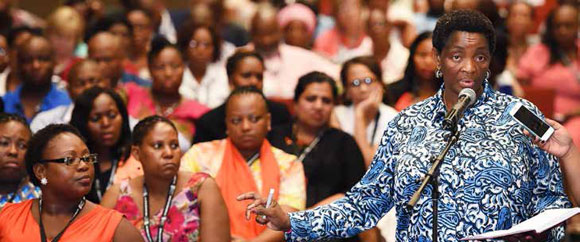 Social workers who attended the Indaba raised their concerns and challenges, including the increasing number of poor immigrants and catering to the needs of lesbian, gay, bisexual, transgender and intersex people – one of the most misunderstood sector of society.
Social workers who attended the Indaba raised their concerns and challenges, including the increasing number of poor immigrants and catering to the needs of lesbian, gay, bisexual, transgender and intersex people – one of the most misunderstood sector of society.
One of the social workers who attended the Indaba, Mapule Mboweni, said she was excited about having a platform where social workers could talk about their challenges.
“This is a breakthrough for us as social workers because we have issues but no platform. At least if there is a platform, solutions will be implemented on a short-term, medium and long-term goal.
“We really appreciate what the Minister of Social Development Bathabile Dlamini is doing. We are not saying that solutions will be created overnight but there is a way forward,” said Mboweni.
Minister Dlamini convened the Social Work Indaba to understand the challenges faced by practitioners and to work with the practitioners to come up with ways to improve the delivery of social services in communities.
In her address, she reminded social workers that the delivery of social services was a right guided by the South African Constitution.
While admitting that the profession was facing challenges, Minister Dlamini also commended social workers for performing ‘exceptionally’ in some areas.
The Minister singled out the performance of social workers in assisting the families of those who died in the Marikana tragedy in 2012 and, recently, the support given to families of South Africans who lost their lives in the Synagogue Church of all Nations building collapse in Nigeria.
During both these incidents social workers provided psychosocial support to families of the deceased.
Minister Dlamini also stressed the importance of extending, not just social security to the needy, but also welfare services.
“As social workers, therefore, we have a critical role to play in helping society to heal through the provision of psychosocial services.”
Mentorship & supervision
Supervision was identified as one of the major reasons why practitioners are unable to provide quality social services to communities.
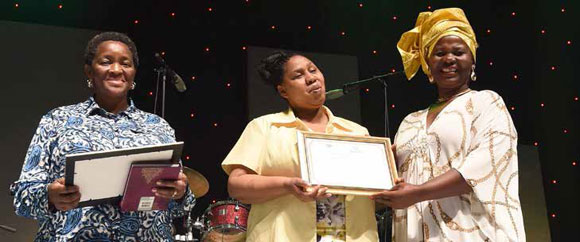 According to the department, social-work supervisors are appointed but they are not enough to effectively mentor the estimated 19 500 practitioners in the Public Service.
According to the department, social-work supervisors are appointed but they are not enough to effectively mentor the estimated 19 500 practitioners in the Public Service.
Currently, the ratio of supervisor to practitioner ranges from 1:10 to 1:13, depending on the area they are in, leaving many practitioners working without supervision.
The department also said social workers deal with a high workload. The current ratio of social workers to the population countrywide is estimated at 1:5000 – well above recommended levels.
Social workers also experience stress, which may sometimes lead to depression, because of the traumatic situations they are often faced with.
The Indaba recommended that practitioners must be debriefed and counseled consistently to help them deal with some of the situations they faced.
Meeting the priority target
The department has rolled out a scholarship programme funding students who want to study social work at universities in order to meet the 55 000 social service practitioner target set by the National Development Plan.
Since the scholarship programme started, about 8 000 young people have graduated and more than 3 500 have been absorbed into the Public Service.
Social Work Veterans' Forum
Attempts to improve the quality of service delivered by social-work practitioners also include the Social Work Veterans’ Forum.
This initiative provides young and upcoming social workers with an opportunity to learn from their veteran counterparts.
Committee to probe abuse in foster homes
Committee to probe abuse in foster homes Estelle GreeffThe Department of Social Development has appointed a committee to look at the abuse of children placed in foster care.
Speaking at the National Social Work Indaba held recently in Durban, Social Development Minister Bathabile Dlamini said the abuse of children was an issue that needed immediate attention.
“There must be a way of finding out what is going on with our kids … we have to put the best interests of our children first,” she said.
The committee will look at the issues such as:
- Children not being taken care of properly while families continue to draw foster care grants.
- A recent court judgment regarding the renewal of foster care grants, which are delayed due to backlogs.
- Invalid orders from the South African Social Security Agency (SASSA).
- Cutting the red tape around foster care.
The committee will also explore extending the foster care grant beyond the age of 18, as long as the child is still at school or studying.
The National Social Work Indaba aimed to develop proposals and interventions aimed at strengthening the impact on social work practice.
The Minister emphasised the need to strengthen mentoring among social workers as well as understanding policy.
“All social workers must understand the legislation, regulations that have to do with the Department of Social Development. No one will lift the profession except social workers…don’t expect someone else to do the work for you, this we have to do ourselves,” the Minister challenged social workers.
She urged the South African Council for Social Service Professions to protect social workers and engage with them throughout the country.
Minister Dlamini said the department was working on absorbing young social workers into the department to ensure that they grow in their profession.
“What we are trying to do right now is to look at how we are going to engage with those young social workers, because they have now become despondent,” she added.
EPWP makes a positive impact in the lives of young people
EPWP makes a positive impact in the lives of young people Albert PuleThe Extended Public Works Programme (EPWP) has made a positive impact in the lives of many young people across the country.
The EPWP targets mostly young people under the age of 35 by giving them jobs to work in various projects in their communities.
According to the Labour Market Dynamics for South Africa 2014 report, seven out of 10 young people who participated in the EPWP and other government job creation programmes were employed, up from 42.8% in 2013 to 56.9% in 2014.
Godfrey Maja from Vryburg is one of the many young people whose life changed as a result of being employed under the EPWP.
Maja left his job as a petrol attendant to join the Expanded Public Works Programme (EPWP) for the upgrading of Hayes Park in the central business district of Vryburg in the North West.
He is one of the 30 young people from Vryburg who were employed during the upgrading of the park. When they started in 2013, some of them did not have technical skills such as plumbing, irrigation, bricklaying, painting and cutting and planting of grass.
“It has been two years of working in this park and I have learned a lot of skills that I can use to empower myself and make a living out of,” he says at the official opening of the park.
He says at the beginning of the construction of the park, he did not know many things. “When I started here I didn’t know a lot of things that I now know and it all because of this park.”
The park will be used as a place of entertainment, play area, wedding reception and municipal functions will be held at the new park.
“Two years ago this park was like a very thick bush and you couldn’t enter here easily, but now look at it,” he says as he points to the well-trimmed lawn and well-manicured flowers on the east side of the park.
He says on behalf of the young people of Vryburg, they are grateful for the EPWP for the chance it gave them and doing something positive about their lives.
“We would like to say thank you to the management team at EPWP for the opportunity they’ve given us especially those of us who were not working before.”
During the upgrading of the park, they earned a stipend of R2200 and the park has a water fountain, braai areas, and jungle gym for children and public toilets.
He said their wish was for EPWP to assist the municipality with more funds so they can upgrade another park situated less than a two kilometres away from Hayes Park.
SA to host Global Entrepreneurship Congress
SA to host Global Entrepreneurship Congress Estelle GreeffInternational relations
South Africa will be the first African country to host the Global Entrepreneurship Congress (GEC) in 2017.
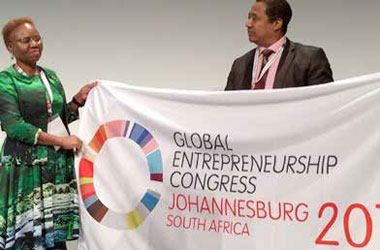 “This is a great opportunity for South Africa and Africa, as a continent, to showcase its entrepreneurial prowess to the world,” Minister of Small Business Development Lindiwe Zulu said at the Global Entrepreneurship Network recently.
“This is a great opportunity for South Africa and Africa, as a continent, to showcase its entrepreneurial prowess to the world,” Minister of Small Business Development Lindiwe Zulu said at the Global Entrepreneurship Network recently.
The bid was awarded to Johannesburg as part of the opening ceremony at GEC 2015 in Milan, Italy.
The GEC is a meeting of start-up champions from more than 150 countries and attracts over 4 000 delegates.
These delegates represent distinct components of their entrepreneurial ecosystems and are focused on how best to help entrepreneurs start and scale new companies, the Department of Small Business Development said.
“The GEC is a platform that would open doors for our youth, ignite entrepreneurship and put our youth in the global arena,” Minister Zulu explained.
She said the award would help sustain the entrepreneurial spirit that is growing momentum of an entrepreneurial revolution that was given impetus by President Jacob Zuma when he announced the establishment of the new Ministry of Small Business Development.
“GEC 2017 will ensure that small business development remains firmly on the national agenda and the radar screen of all stakeholders,” Minister Zulu said.
Member of the Mayoral Committee in the City of Johannesburg, Ruby Mathang, said the four-day conference would have significant economic benefits for the tourism, leisure and hospitality sectors – approximately R45 million for Johannesburg alone.
“This is indeed an honour and also an opportunity to entrench the City of Johannesburg’s objective to encourage entrepreneurship in order to stimulate economic growth and create jobs,” she said.
The Congress has previously been held in the United States, United Arab Emirates, China, United Kingdom, Brazil, Russia and Italy.
Trade and investment mission inspires hope
Trade and investment mission inspires hope Estelle GreeffInternational relations
Gauteng businesswoman Jill Carol Sesoko is one of many South African entrepreneurs who dream of growing their businesses outside of South Africa.
Sesoko’s Krugersdorp based company, GreenThermo Energy, was part of the South African businesspeople that participated in the Department of Trade and Industry’s Trade and Investment mission to Ethiopia and South Sudan recently.
The aim of the mission was to find export markets for South African products and services.
The mission also intended to increase trade and investment between South Africa and the two countries, and also help South African companies that would like to export value-added products and those looking for investment opportunities and joint venture partnerships.
GreenThermo Energy, which also manufactures biodiesel, is South Africa’s only supplier of fuel performance catalyst (FCP).
FPC is a fuel combustion technology that enhances the combustion power of fuel, thereby increasing the burning rate of fuel, resulting in the reduction of greenhouse gas emissions and fuel consumption of up to 10 per cent, among others.
According to Sesoko, GreenThermo Energy boosts environmental saving efforts of petroleum wholesalers, bulk consumers, logistics and fleet management companies in realising sustainable improvements in fuel efficiency and emissions reduction through innovative fuel combustion based green fuel products and services.
The company has, for the past four years partnered with the Australian fuel manufacturer to deliver a localised, dedicated fuel efficiency service tailor-made to meet Africa’s fuel energy efficiency needs.
“I am hoping that we will be able to get exposure and make inroads into the market there.
“We have no doubt that our product will generate interest there but we are hoping to do more than that by signing contracts and sealing deals to supply the catalyst and add value to the current initiatives to promote cleaner and greener fuel strategies,” said Sesoko, a mother of two from Ga-Rankuwa, Tshwane.
Sesoko is confident that opportunities for her company would also open up in other countries, as many of them are in the process of adopting the mandatory use of biodiesel to reduce greenhouse gas emissions and protect the environment.
SA, Sudan pledge money to fund research
SA, Sudan pledge money to fund research Estelle GreeffInternational relations
South Africa and Sudan have agreed to work together to boost sectors such as agriculture, health and energy.
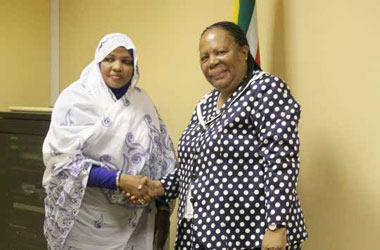 The two countries each pledged R2 million to support researchers in both countries.
The two countries each pledged R2 million to support researchers in both countries.
Science and Technology Minister Naledi Pandor and her Sudanese counterpart, Tahani Abdalla Attla, signed the agreement to fund researchers.
The agreement is part of efforts to speed up a pact signed in Khartoum last November to support research work in South Africa and Sudan.
Addressing the media after signing the agreement, Minister Pandor said she was extremely pleased by the agreement.
“We have invited the minister to come and experience our research programmes,” she said.
The Sudanese Minister and her delegation were in the country on a week-long visit, which included visits to a number of science related projects.
Minister Abdalla said she was happy the two countries were taking the agreement further.
“Our visit is mainly to activate the agreement.”
Through the agreement, South Africa and Sudan will work together in the fields of agriculture and animal resources, nanotechnology, health, energy and space science, as well as other crossing-cutting areas such as intellectual property and the benchmarking and development of science, technology and innovation policy.
South Africa and Sudan established diplomatic ties in 1994 and have since maintained good relations as a result of the role South Africa played in the peace and reconciliation process between Sudan and South Sudan.
Active kids, better school results
Active kids, better school results Estelle GreeffSports, arts and culture
Daily physical activity can help school children perform better and make schools healthy places of learning.
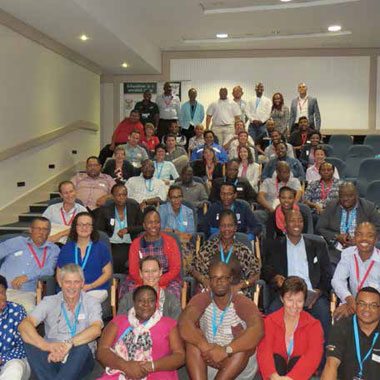 To encourage physical activity at schools, the Department of Basic Education (DBE), in partnership with the Physical Education Institute of South Africa (PEISA), held a Physical Education Symposium in Cape Town recently to come up with ways to encourage learners across the country to be physically active.
To encourage physical activity at schools, the Department of Basic Education (DBE), in partnership with the Physical Education Institute of South Africa (PEISA), held a Physical Education Symposium in Cape Town recently to come up with ways to encourage learners across the country to be physically active.
Director of Enrichment and Sport in Education at DBE Nozipho Xulu said parents must encourage their children to be physically active.
“Parents are encouraged to lead this process by displaying and engaging in physical activities like using stairs instead of lifts, limit the use of video games and encourage as well as participate in free play activities with their children.”
Xulu said physical activity had many benefits for children, including improving their level of concentration in class.
“There is enough evidence to prove that cardio vascular activities have direct benefits for children and adolescents. This includes muscle strengthening, bone strengthening, development of fine and gross motor skills as well as lowering of blood pressure.
“Those have direct benefits to optimal learning processes and improved academic achievement, especially in mathematics and reading.”
She said the move to encourage children to be active is supported by different stakeholders in the education sector.
The South African Democratic Teachers Union (SADTU) and Supersport – Lets Play have pledged their support to the initiative, while Save the Children South Africa will host “Race for Survival” that will see a number of young learners participating.
Resolutions of the symposium.
Delegates at the symposium agreed that more practical solutions were needed to deal with the state of physical education in South Africa and improve on the results of the 2014 Healthy Active Kids South Africa Report Card.
This would be done by:
- Creating and distributing a School Self- Assessment Tool Kit (School Physical Activity and Nutrition Environment Assessment)
- Establishing School Physical Activity Indicators which include
- Physical education
- School sport
- Active travel
- Break time physical activity
- After school sports and physical activities (dance, indigenous games, fitness events, etc.)
- School physical activity environment
- Learner health-related fitness
- Joining the Global Alliance for Healthy Active Kids
Charlotte Maxeke’s home to become a museum
Charlotte Maxeke’s home to become a museum Estelle GreeffSports, arts and culture
The Gauteng Provincial Government has announced that the house of struggle stalwart and one of the famous 1956 Women’s March leaders, Charlotte Maxeke, will be converted into a museum and interpretation centre.
Maxeke was the first black woman to obtain a BSc Degree, which she earned in 1901. In 1913, she also successfully led the first anti-pass march by women in the Free State towns of Bothaville and Bloemfontein, and was also one of the courageous women who marched to the Union Buildings on 9 August 1956 in protest against pass laws.
Gauteng Infrastructure Development MEC Nandi Mayathula-Khoza made the announcement at an International Women’s Day celebration at Kliptown’s Walter Sisulu Square of Dedication.
She delivered a keynote address on behalf of Gauteng Premier David Makhura.
“In line with the theme for this year’s International Women’s Day celebration, we will convert the house of Charlotte Maxeke into a museum and interpretation centre.
“This enhances the clarion call of the UN Women's Beijing +20 campaign: Empowering women, empowering humanity - picture it!” said MEC Mayathula-Khoza.
She said they proposed the theme ‘Make it happen: together moving Gauteng city region forward for women’ for this year’s International Women’s Day celebration.
“We decided to partner with women from all walks of life and sectors in this celebration to give expression to gender priorities … and to showcase programmes and direct service delivery initiatives to improve women's lives in partnership with women’s organisations,” she said.
MEC Mayathula-Khoza said the provincial government would also celebrate the 1954 Women’s Charter that aimed to unite women in common action for the removal of all political, legal, economic and social obstacles and strive to achieve women’s rights.
The MEC praised the provincial government for the achievements in improving the quality of lives of women. She cited the role women now play in leading businesses, governments and global organisations.
“We have removed laws, regulations, conventions and customs that discriminate against women. More women today occupy positions of power in all spheres of life. We continue to accelerate the implementation of gender equality and women empowerment policies,” she said.
A good reason to visit your public library
A good reason to visit your public library Estelle GreeffSports, arts and culture
In today’s world of making things happen for yourself, knowledge is the most valuable tool you need to push yourself to the next level. This is why government is putting the power of knowledge at the fingertips of communities through the Mzansi Libraries On-Line pilot project.
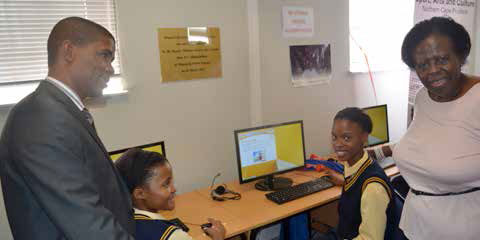 Government has set aside R32 million for the project, which will provide free internet connectivity to South Africans through public libraries. Communities can then access information on government services and other information, which can be used to better their lives.
Government has set aside R32 million for the project, which will provide free internet connectivity to South Africans through public libraries. Communities can then access information on government services and other information, which can be used to better their lives.
Deputy Minister of Arts and Culture Rejoice Mabudafhasi officially launched the pilot at Mapoteng Public Library in Gamagara Local Municipality, in Kuruman in the Northern Cape.
Rietfontein and Galeshewe Public Libraries in the Northern Cape will also benefit from the project.
Each library will receive equipment estimated at R470 000, which includes 20 computers, two printers, one document scanner, software, 10 tablets, 10 e-Readers and gaming gadgets.
The pilot project will run for two years and could be extended to five if the results are successful.
The Bill and Melinda Gates Foundation, together with the National Library of SA, will run the pilot in all nine provinces to put digital resources in the hands of people.
“The main aim of Mzansi Libraries On-Line is to provide free internet connectivity for all South Africans through public libraries and create an informed and information literate society, in support of the goals of the National Development Plan,” said Deputy Minister Mabudafhasi.
She said by giving South Africans information, Mzansi Libraries On-Line will enable citizens to participate meaningfully in a democratic and knowledge-based society.
She added that information communication technology could be used to fight poverty, increase employment and educate the community on entrepreneurship.
“People use broadband for different reasons but mainly for communication, work and research. With universal access, people will not need to call their municipality or go to Home Affairs or Social Welfare. They can do everything online at their local library.
“In many communities, the only free public access to computers and the internet is available at public libraries, which indicates that government’s investment in public libraries delivers a good return.”
She encouraged communities to make good use of these libraries. “The community must develop a culture of reading and a life-long desire to learn and develop intellectually, emotionally and culturally.”
The launch of the Mzansi Libraries On-Line project was also attended by Northern Cape MEC for Sport, Arts, and Culture Lebogang Motlhaping, who said that libraries were the nucleus of communities.